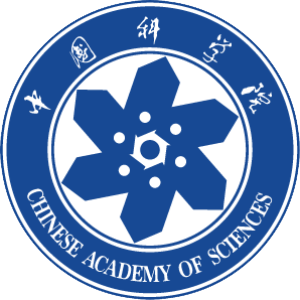-
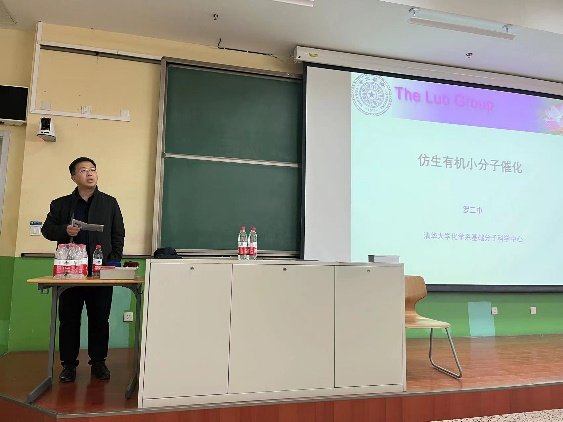 Prof. Luo Sanzhong lectures on "Bionic Small molecule Catalysis: Mechanism, Data and Machine Language"
Prof. Luo Sanzhong lectures on "Bionic Small molecule Catalysis: Mechanism, Data and Machine Language"At 14:00 on November 8, 2022, Professor Luo Sanzhong from the Department of Chemistry of Tsinghua University was invited by Professor Huang Hui to deliver the keynote lecture "Bionic Small molecule Catalysis: Mechanism, Data and Machine Language" in the University of Chinese Academy of Sciences. The lecture was held in Room 207 on the first floor of the teaching Hall.

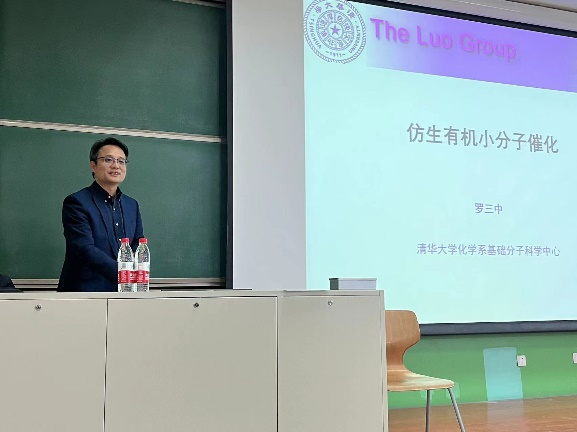
Modern catalytic reaction systems are delicate and complex, and the dimensions of the catalytic process are numerous and dynamic, so it is still a challenge to clarify the catalytic mechanism, outline the structure-activity relationship of catalysis and realize rational design.
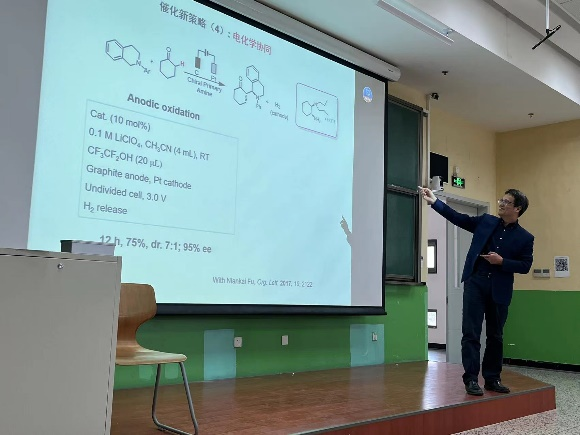
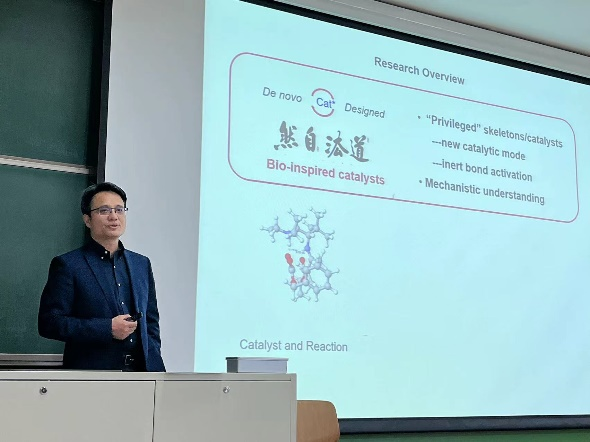
In the lecture, Professor Luo Sanzhong firstly took the research results of bionic o-quinone catalytic system, asymmetric ammonomethyl reaction and asymmetric alkyl sulfide reaction as examples, and systematically introduced the development of bionic catalytic system based on biology from three aspects: multi-functional group coordination, coenzyme simulation and mechanism simulation. Four new catalytic strategies, namely metal catalytic synergy, organic small molecule catalytic synergy, photocatalytic synergy and electrochemical synergy, were introduced. Then Professor Luo explained the mechanism and law research to the students, such as the bionic mechanism of anionic proton shuttle, using the mechanism model to help the racemization chiral synthesis path breakthrough and so on. The application of artificial intelligence in the field of molecular catalysis is also introduced, especially the SPOC descriptor and its application in the reaction of aldol catalyzed by pKa and amino group. Finally, Professor Luo Sanzhong communicated and discussed with the teachers and students on site, which was warmly responded by the teachers and students on site.
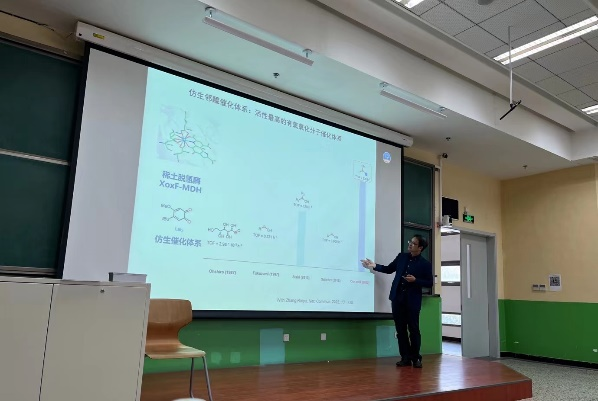
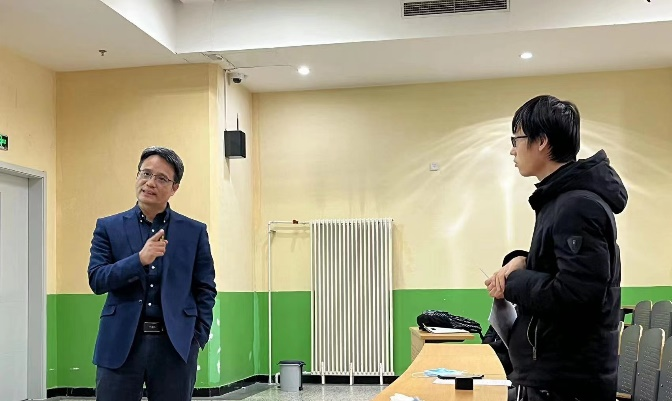
Luo Sanzhong is a professor in the Department of Chemistry at Tsinghua University. He is currently the Deputy dean of the Department of Chemistry at Tsinghua University and the director of the Center for Basic Molecular Science at Tsinghua University. He received his Ph. D. degree from the Institute of Chemistry, Chinese Academy of Sciences in 2005. From 2005 to 2018, he worked at the Institute of Chemistry, Chinese Academy of Sciences, and from 2018 to Tsinghua University. He won the Youth Chemistry Award of the Chinese Chemical Society in 2008, the Lu Jiaxi Young Talent Award of the Chinese Academy of Sciences in 2009, the National Outstanding Youth Grant of the National Natural Science Foundation in 2010, and was elected to the Youth Innovation Promotion Association of the Chinese Academy of Sciences in 2011 as the president (2011-2015), and the Youth Top Talent Grant of the 10,000 Thousand Program of the Organization Department of the Central Committee in 2012. He was awarded the May Fourth Medal of China Youth in 2014, the Chiral Youth Chemistry Award of Chinese Chemical Society in 2016, and the Physical Organic Chemistry Youth Award of Chinese Chemical Society in 2017. In 2017, he was selected as "Young and Middle-aged Leading Talents in Science and Technology Innovation" by the Ministry of Science and Technology. In 2018, he was selected as the innovation leader of the Organization Department of the CPC Central Committee. He is Deputy Director of the Physical Organic Committee, member of the Organic Chemistry Committee, member of the Photochemistry Committee and member of the Homogeneous Catalysis Committee of the Chinese Chemical Society.
-
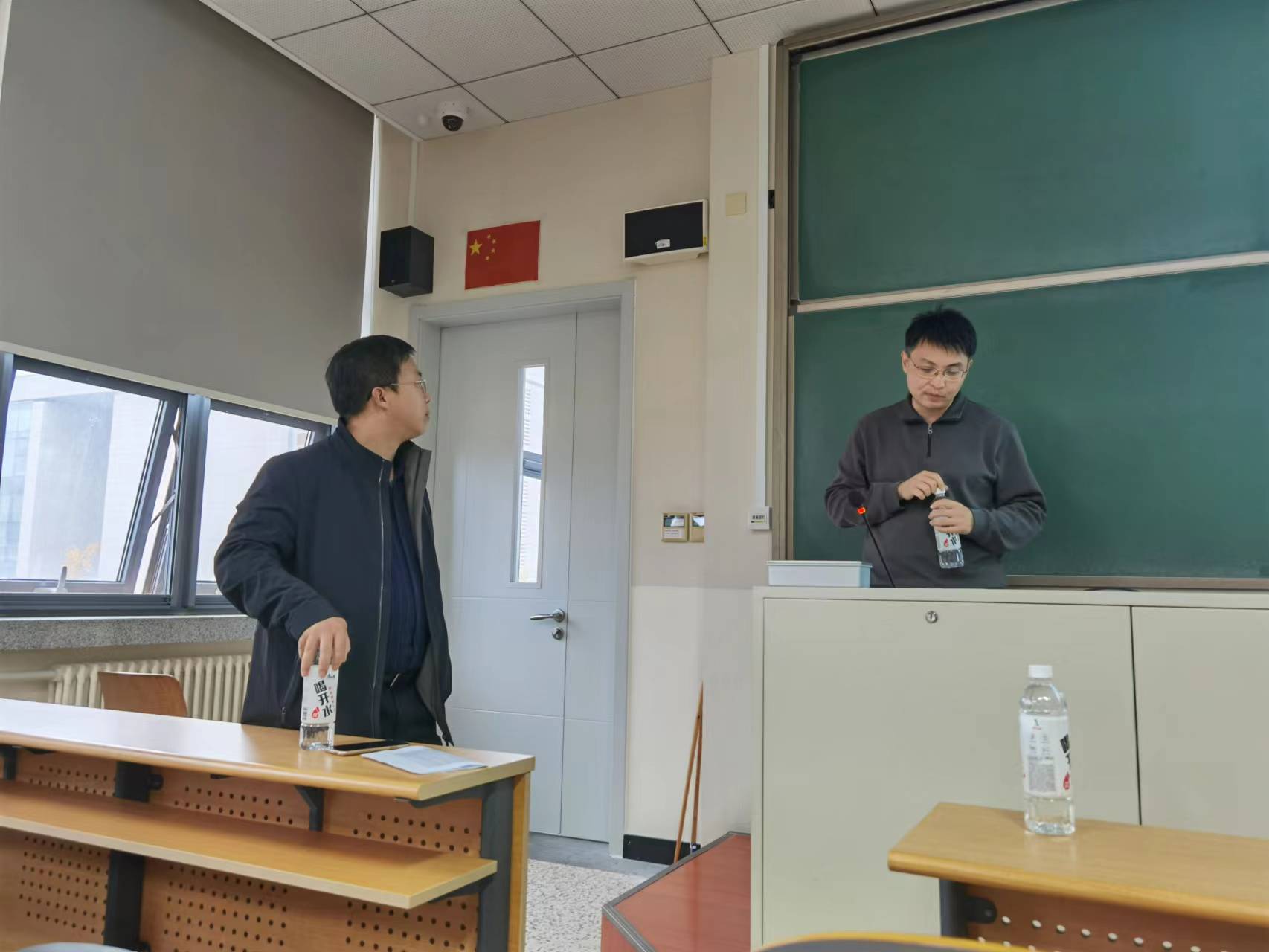 Lecture by Prof. Zhao Yongsheng on "Organic micro-Nano Laser Materials and Devices"
Lecture by Prof. Zhao Yongsheng on "Organic micro-Nano Laser Materials and Devices"At 15:30 on October 26, 2022, Zhao Yongsheng, a researcher from the Institute of Chemistry, Chinese Academy of Sciences, was invited by Professor Huang Hui to give a keynote lecture on "Organic micro-nano laser materials and Devices" in the University of Chinese Academy of Sciences. The lecture was held in Room 306 on the first floor.

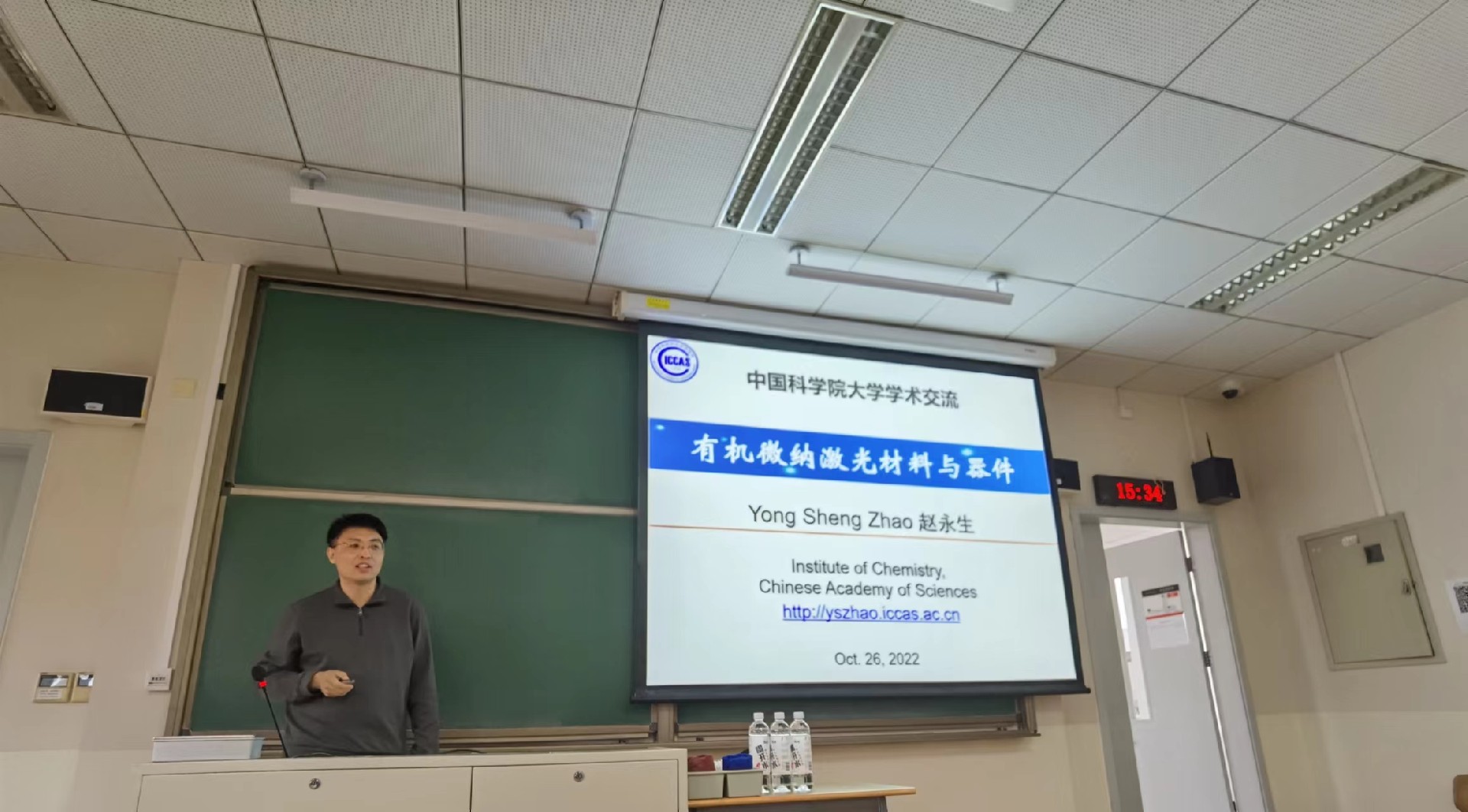
Laser is one of the most important and great inventions of mankind since the 20th century. It has been widely used in many fields of military and national defense, industrial production and People's Daily life. With the progress of science and technology, laser technology is also developing, among which micro-nano laser is the research frontier of laser technology and nanoscience.
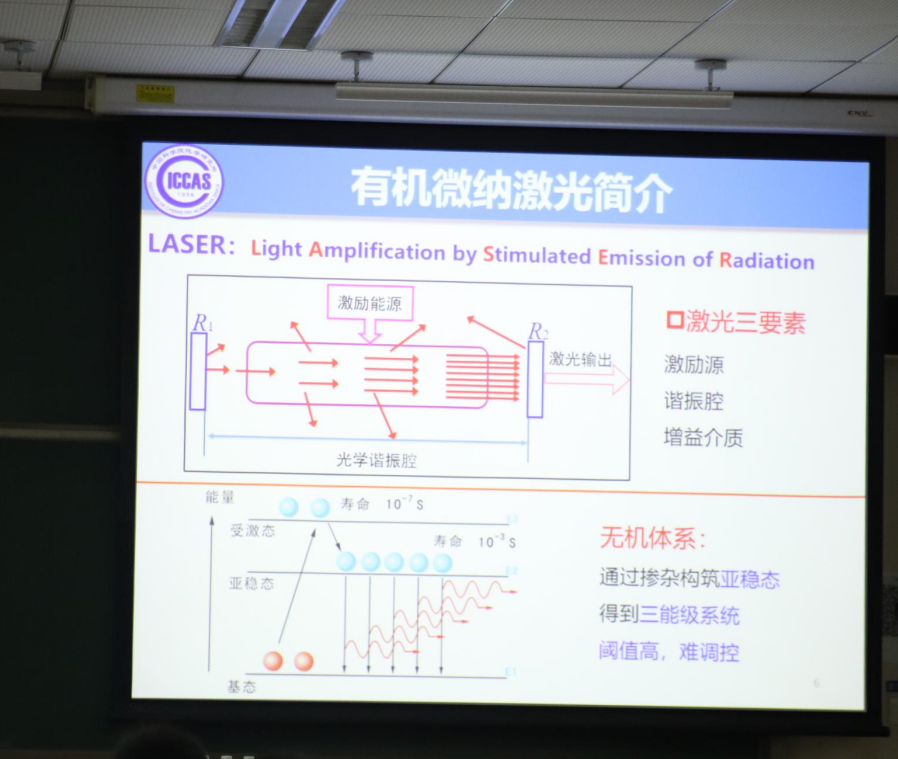
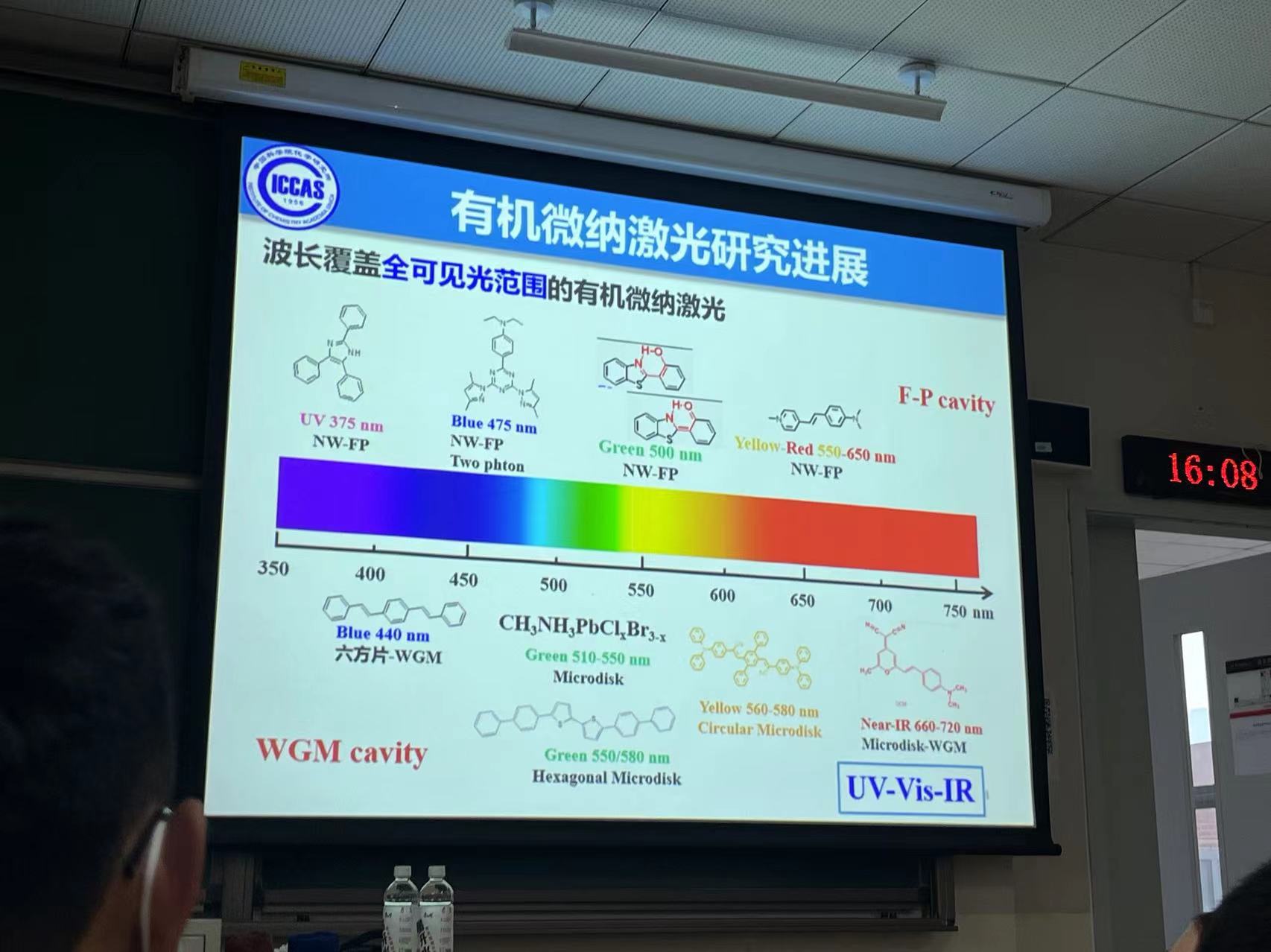
Professor Zhao Yongsheng first introduced organic micro-nano laser in a clear way, and pointed out that the key challenges in the research and application of organic laser are: the construction of high performance organic micro-nano (electrically pumped) laser and the controllable processing of large area organic micro-nano single crystal laser array. Then, the research progress of organic micro-nano laser is described from two aspects: the controllable assembly of organic micro-nano resonator and the excited state process of organic materials -- new micro-nano laser. The team realized the arbitrary adjustment of laser output wavelength between all vibration bands in the full spectrum range for the first time. The exploration and outstanding achievements of the team on organic micro-nano electric pump laser are introduced, such as improving the efficiency of electric injection by designing new molecular systems and generating threshold-free laser by Bose-Einstein condensations of excitons, etc. The application of organic micro-nano laser in display field is also introduced. Finally, Professor Zhao Yongsheng communicated and discussed with the teachers and students on the spot, and got the warm response from the teachers and students on the spot.
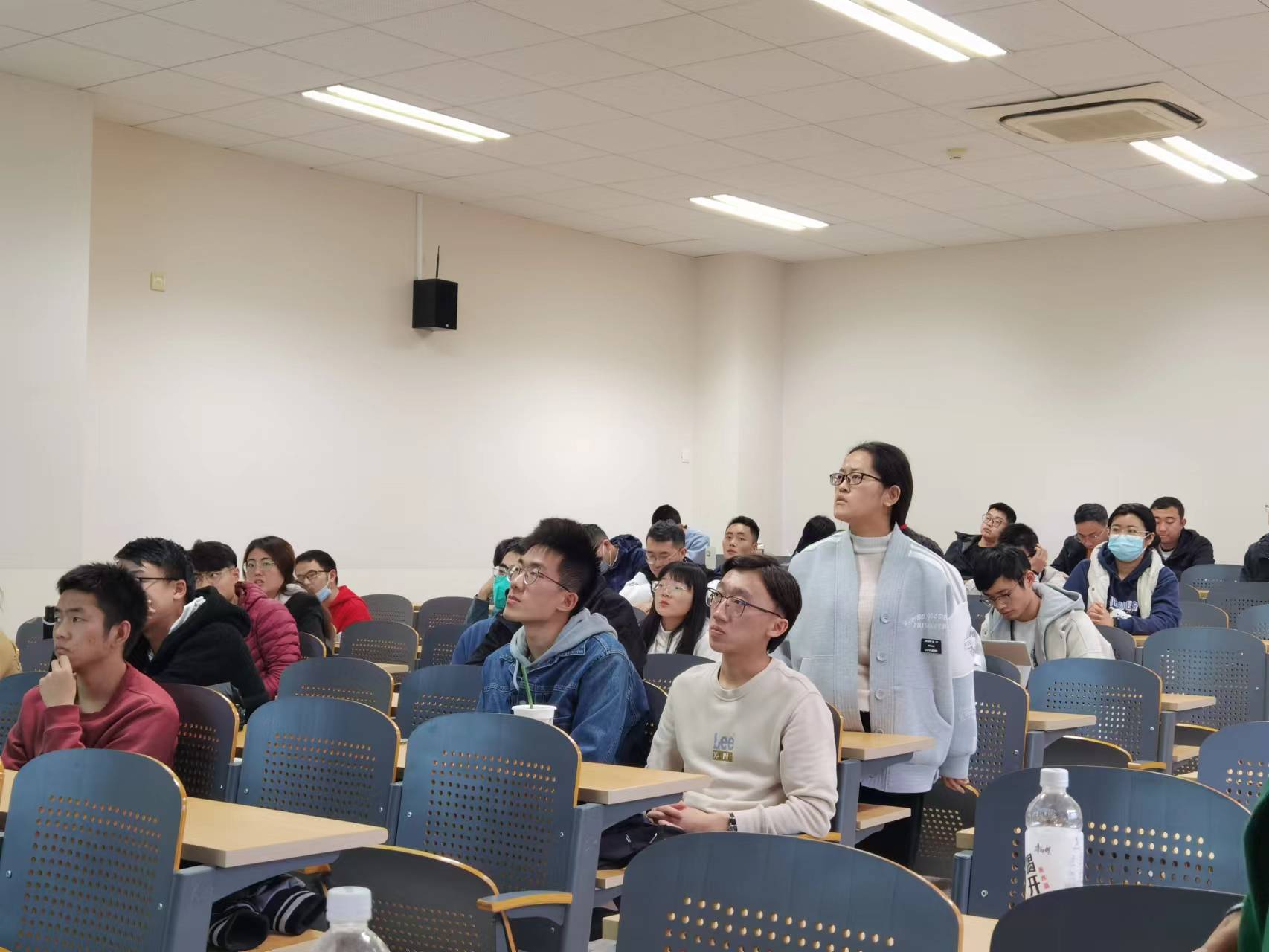
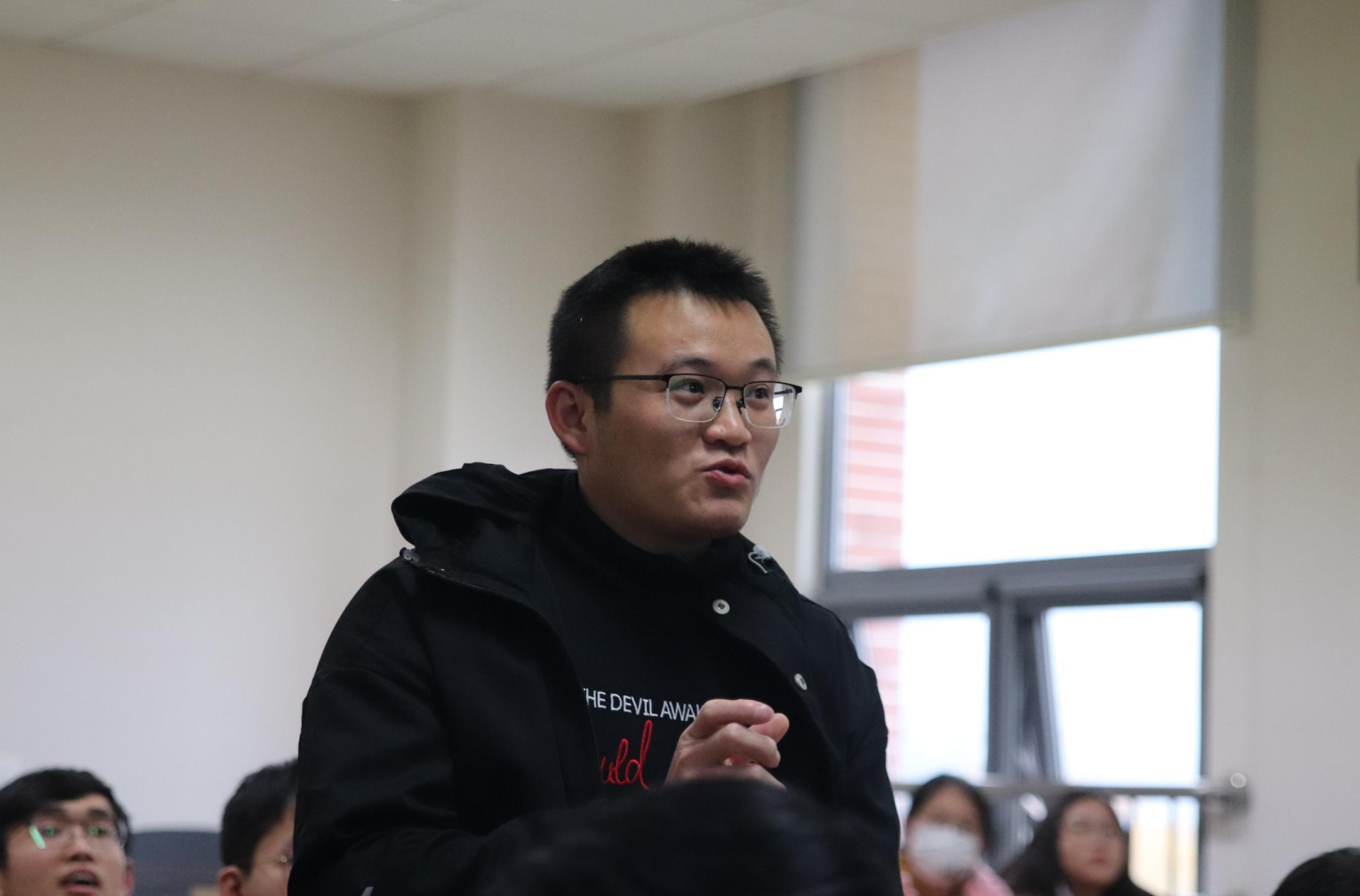
Zhao Yongsheng is a professor at the Institute of Chemistry, Chinese Academy of Sciences. In October 2009, he was selected as one Hundred Talents Program of the Institute of Chemistry, Chinese Academy of Sciences. In 2011, he was awarded the National Science Foundation for Outstanding Young Scholars. In 2017, he was selected as the Leading talents of the Ten Thousand Talents Program. Prof. Zhao Yongsheng was elected as a Fellow of the Royal Society of Chemistry in 2015, and a Fellow of the Chinese Chemical Society in 2022. He has won the Royal Society of Chemistry ChemComm Young Scientist Award, the Asia Oceanian PhotoChemistry Association Young Scientist Award, the Zhongguan Chemical Professors Association Distinguished Professor Award and other international academic awards. And more than 10 domestic academic awards including the Second Prize of National Natural Science (the Second Accomplisher), Science Exploration Award, Ho Liang Ho Li Award, China Youth Science and Technology Award, Beijing Zhongguancun Award for Outstanding Young People, Chinese Chemical Society - Tibet Innovation Award, etc.
-
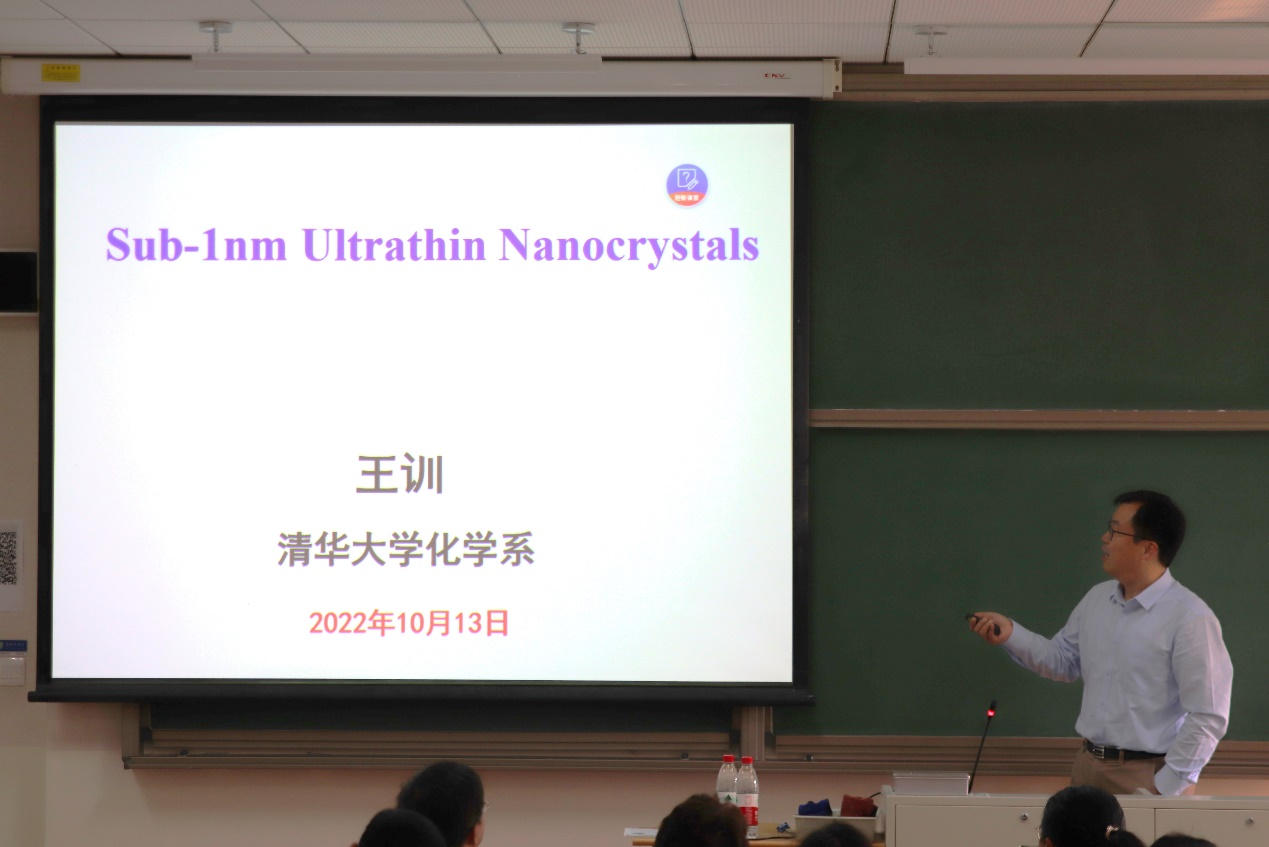 Prof. Wang Xun's lecture on "Sub-1nm Ultrathin Nanocrystals".
Prof. Wang Xun's lecture on "Sub-1nm Ultrathin Nanocrystals".In the afternoon of October 13, 2022, Professor Wang Xun from the Department of Chemistry of Tsinghua University was invited by Professor Huang Hui to give a lecture on " Sub-1nm Ultrathin Nanocrystals " at the University of Chinese Academy of Sciences.

As research in nanoscience continues to advance, more and more research is now focused on the bottom end of the "nanoworld": the scale of one nanometer or so or even one nanometer below, which is defined as "sub-nanometer" scale materials.
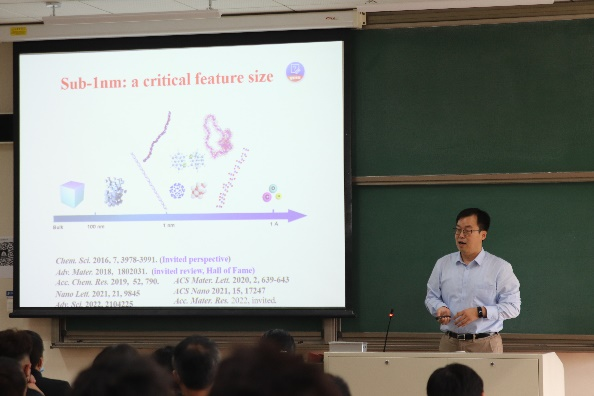
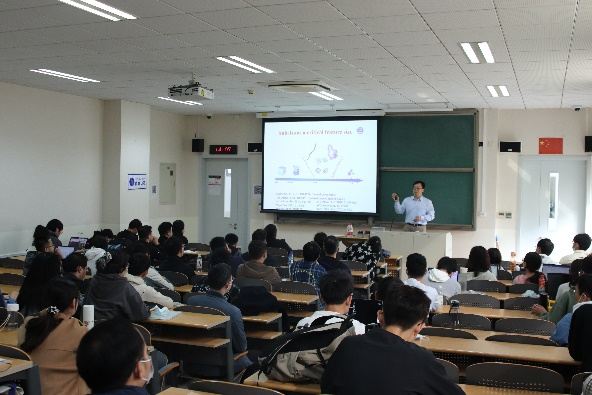
Polymeric materials are widely used because of their flexibility and good processing characteristics. However, inorganic materials tend to be hard and brittle in mechanical processing due to the composition of polar bonds, which limits the practical application of the materials to some extent. Prof. Wang Xun started with the inorganic nanowires in their previous work. They found that these inorganic nanowires have certain properties of polymer materials, so Wang Xun's group took this as a starting point and used electron microscopy to observe that the nanowires have very obvious structural flexibility, the skeleton can be bent in all directions arbitrarily, and even self-winding to form closed rings; and the dispersion of this nanowire has a polymer solution with After that, Prof. Wang Xun's group extended the system and discovered a wide range of properties of sub-nanomaterials. They then investigated two-dimensional and clustered sub-nanomaterials and found that these materials have good mechanical and electrochemical properties, greatly expanding the applications of sub-nanomaterials. After the presentation, Prof. Wang Xun received a warm applause from the students and faculty.
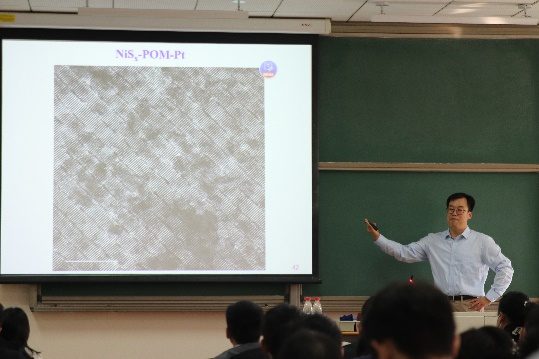
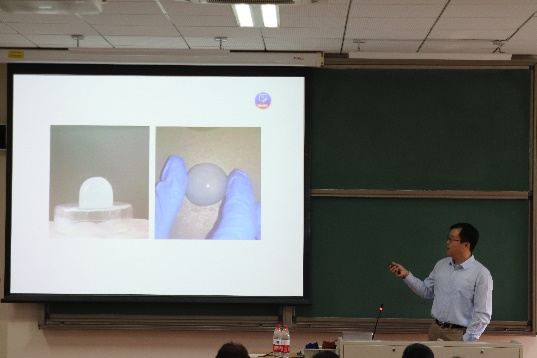
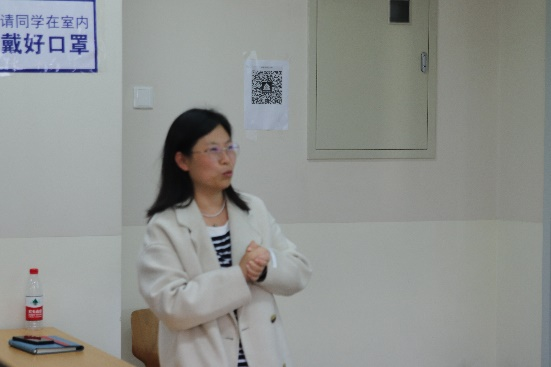
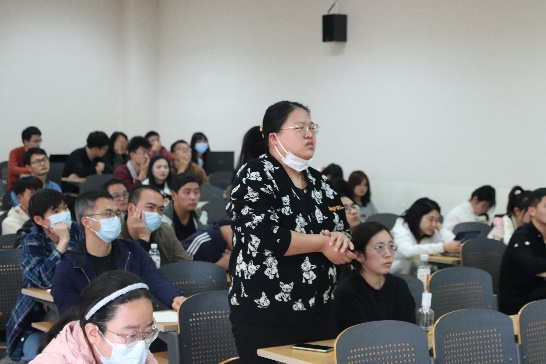
Xun Wang, professor in the Department of Chemistry, Tsinghua University, China. He was awarded the "Outstanding Young Scientist Fund" by the National Natural Science Foundation of China in 2007 and the "Cheung Kong Scholar Distinguished Professorship" in 2014. He is the Deputy Secretary General of the Chinese Chemical Society and the Deputy Secretary General of the Nanomaterials and Devices Branch of the Chinese Society for Materials Research.
-
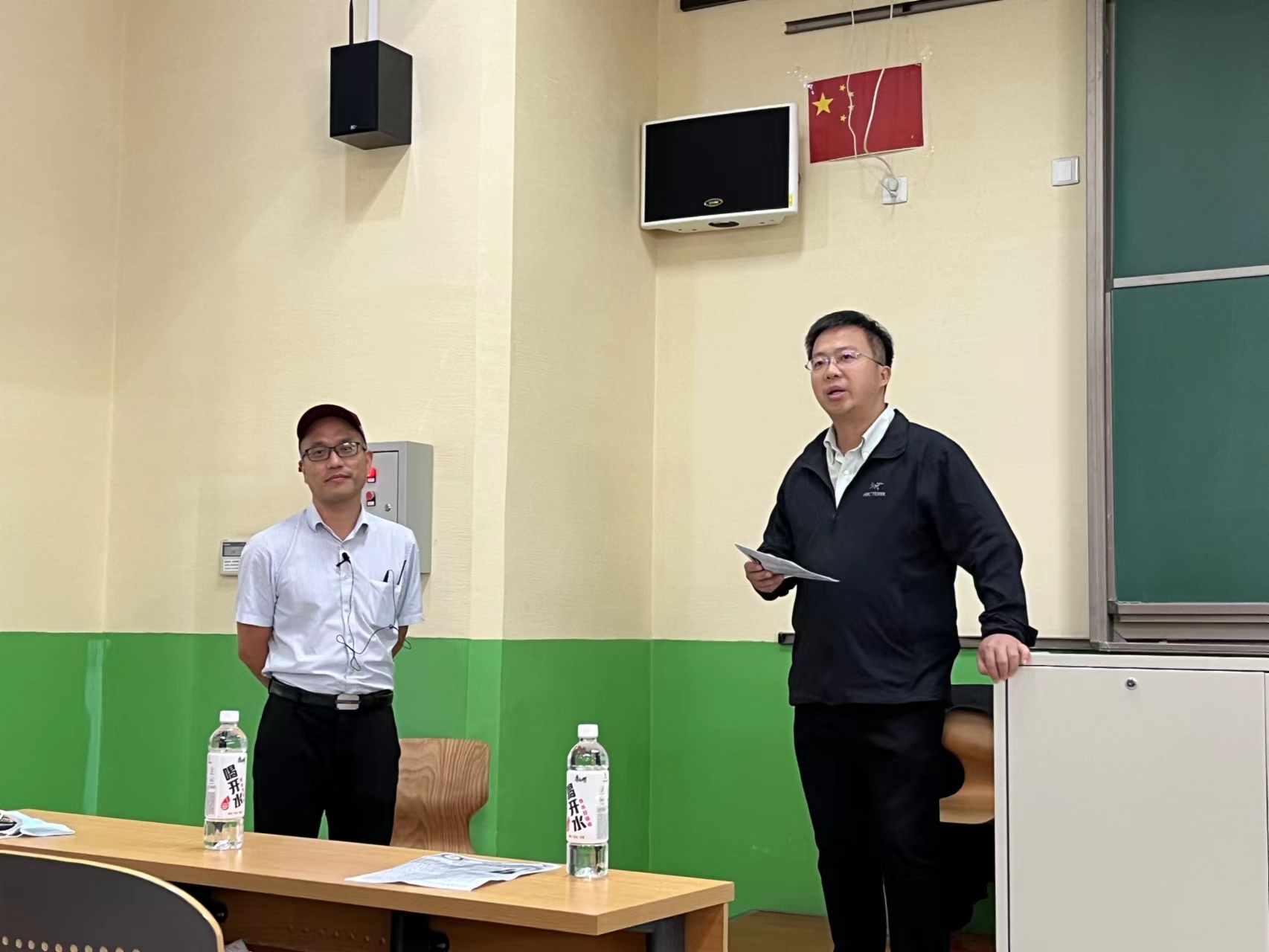 Professor Xu Huaping's lecture on "Dynamically Responsive Selenium/Tellurium Containing Polymers
Professor Xu Huaping's lecture on "Dynamically Responsive Selenium/Tellurium Containing PolymersOn the morning of September 30, 2022, Professor Xu Huaping from the Department of Chemistry of Tsinghua University was invited by Professor Huang Hui to give a lecture on "Dynamically Responsive Selenium/Tellurium Containing Polymers" at the University of Chinese Academy of Sciences (UCAS) in Room 208 of the First Teaching Building.
Selenium/tellurium-containing polymer materials have gained widespread attention in recent years due to their potential for applications in self-healing, shape memory, information storage, optical programming materials, and medical materials.

In his lecture, Prof. Huaping Xu gave a clear and organized introduction to the history of the development of selenium/tellurium-containing polymer materials. Firstly, the unique bond energy of C-Se bond determines its unique dynamic responsiveness. The team synthesized various Se containing polymer materials and found that these materials have unique dynamic responsiveness. Then atomic force microscopy was used to test the chain-breaking energy and explain why the Se containing polymer materials are dynamically responsive from the bond energy perspective. He also introduced the applications of Se/Tellurium-containing polymer materials in various fields such as self-healing, shape memory, information storage, optical programming materials, hydrophobic materials, and medical materials. Finally, Prof. Xu Huaping exchanged and discussed with the students and teachers on site, which received enthusiastic responses from them.
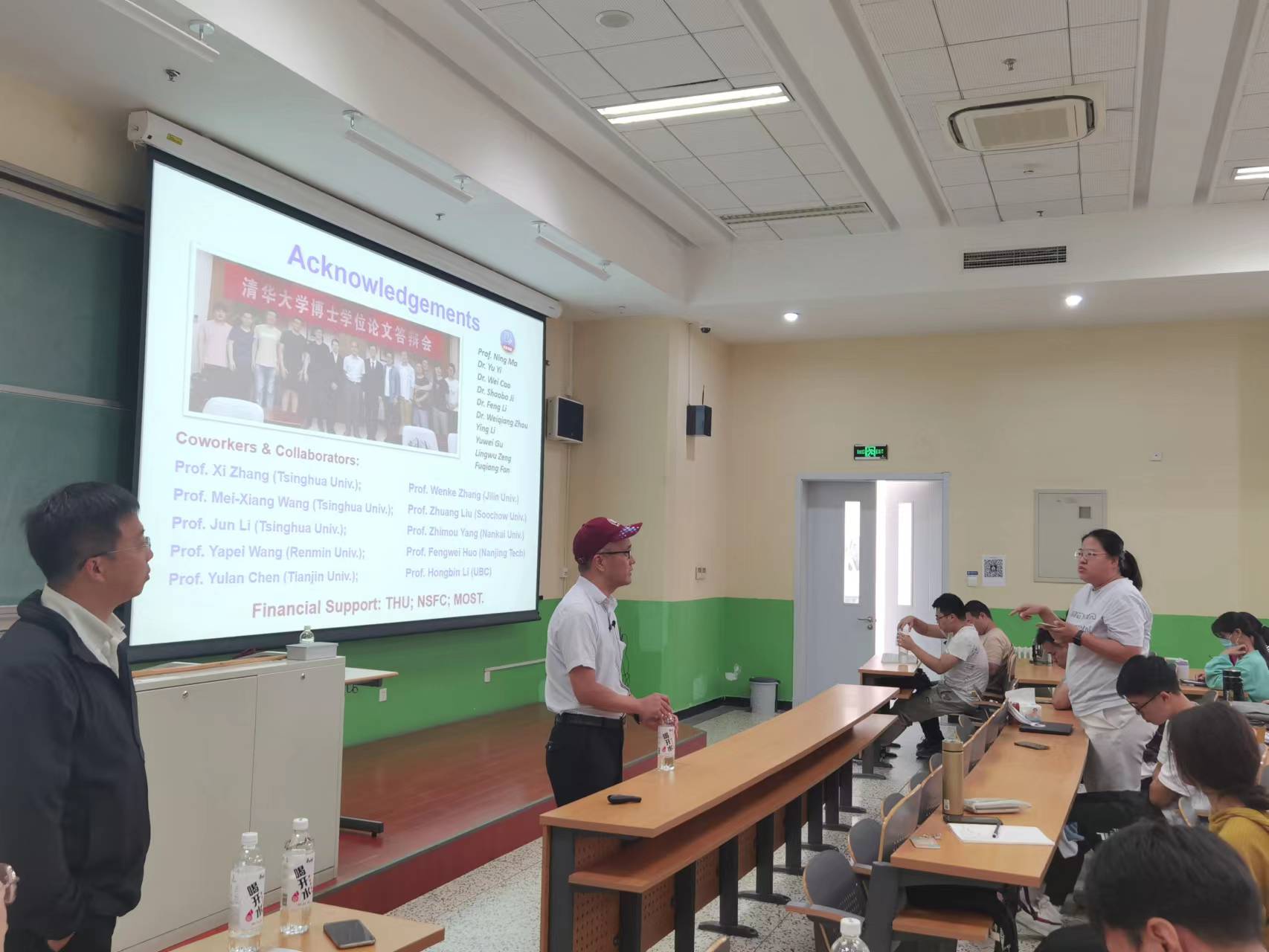
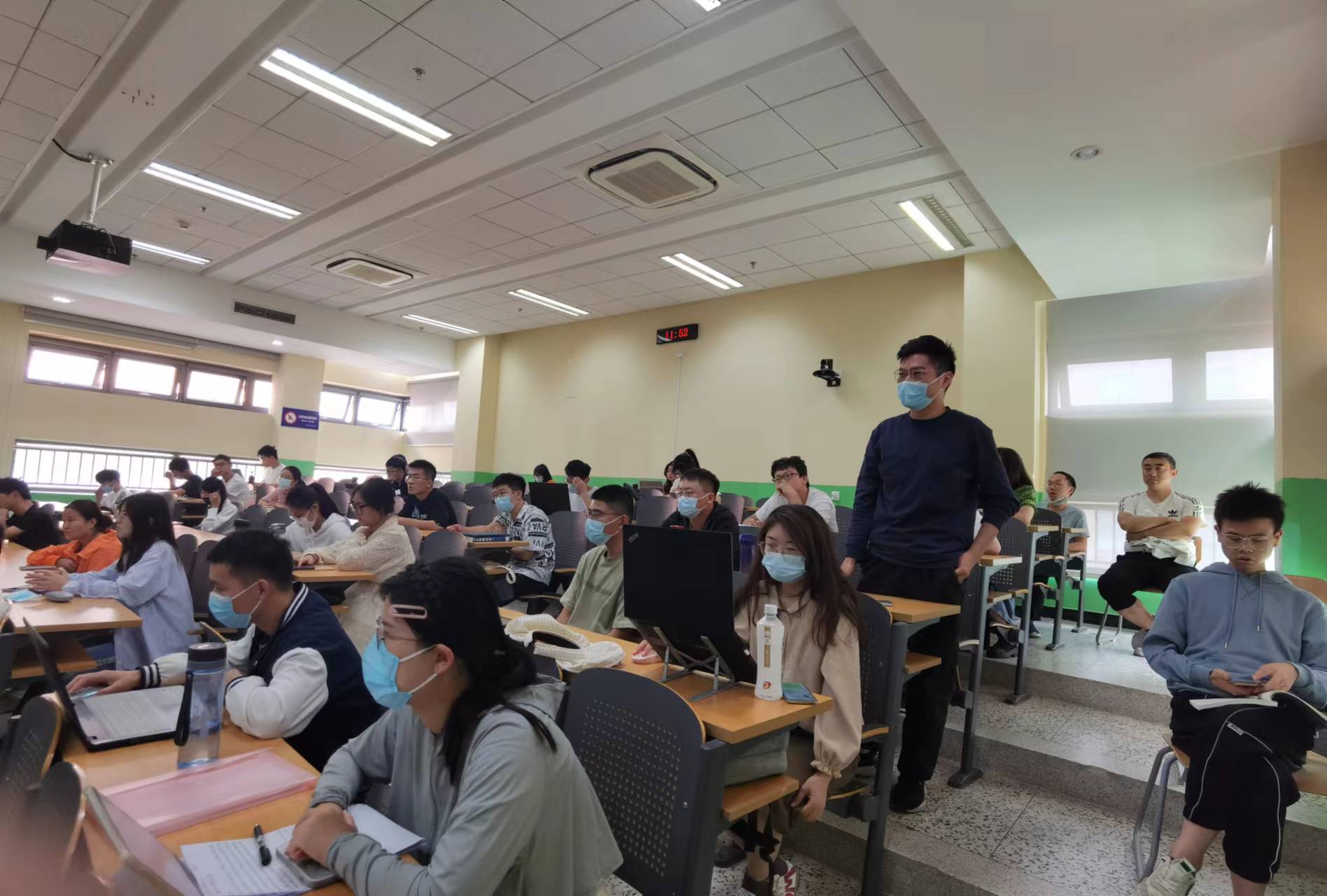
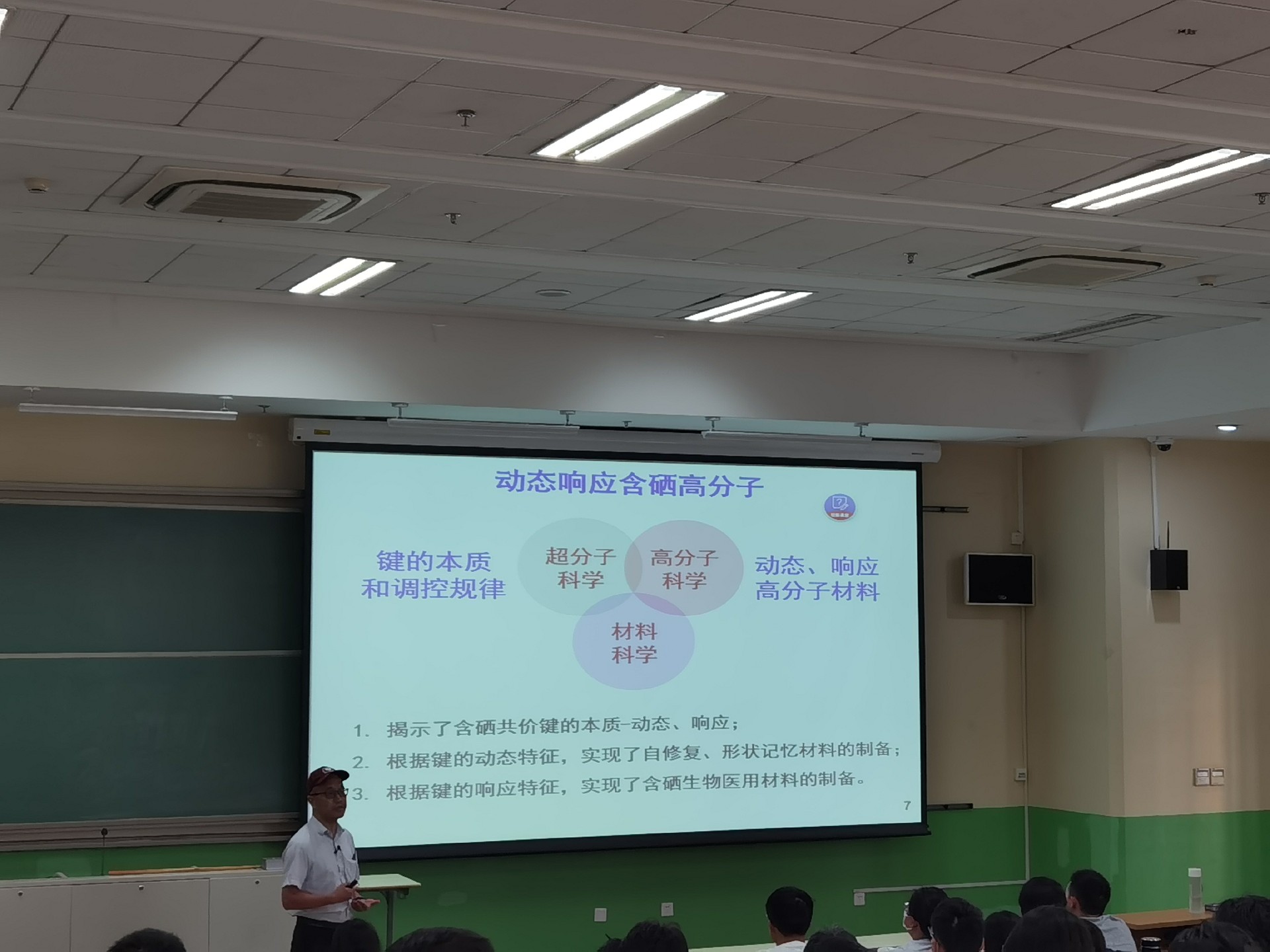
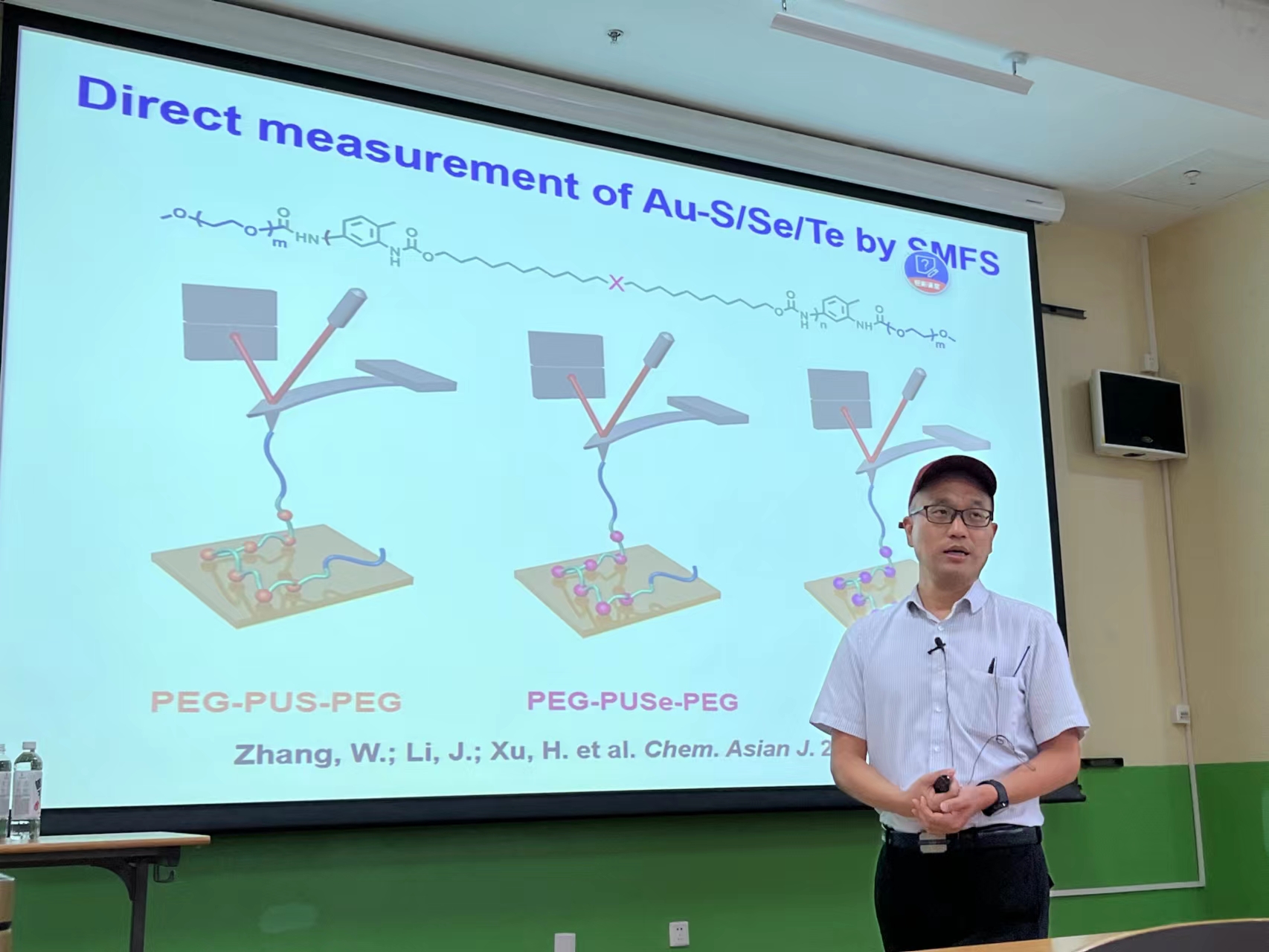
Huaping Xu, Professor, Department of Chemistry, Tsinghua University, China, received his B.S. and Ph.D. degrees in 2001 and 2006, respectively, from the School of Chemistry, Jilin University, China, under the supervision of academician X. Zhang, and spent a year of exchange study at KU Leuven, Belgium, from 2004 to 2005. He has been a professor in the Department of Chemistry, Tsinghua University since 2014, and was awarded the "Young Chemistry Award of the Chinese Chemical Society" in 2011 and the "Outstanding Young Scientist Fund" by the National Natural Science Foundation of China in 2014. He is an associate editor of ACS Biomaterials Science & Engineering and an editorial board member of ACS Macro Letters, Supramolecular Materials, and Chemical Education.
-
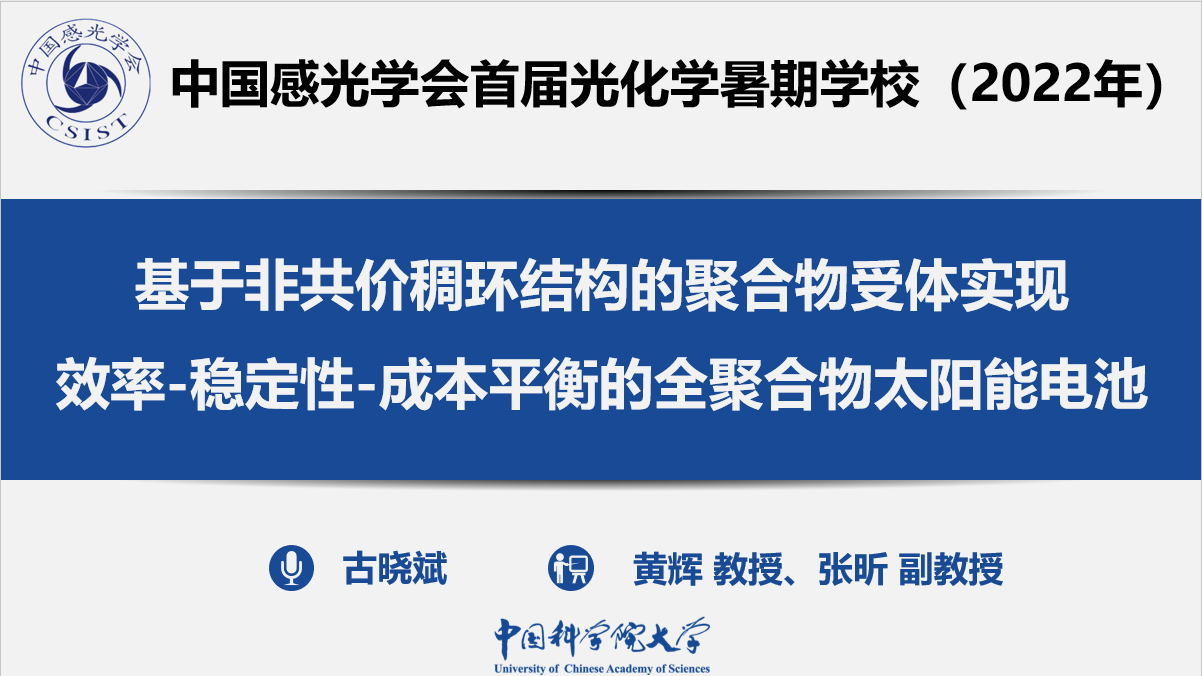 Congratulations to Xiaobin Gu for winning the Excellent Oral Presentation Award of the First Photoch
Congratulations to Xiaobin Gu for winning the Excellent Oral Presentation Award of the First PhotochXiao Bin Gu gave an oral presentation entitled "All-polymer solar cells with efficiency-stability-cost balance based on non-covalent thick-ring structure of polymer acceptors", reporting the recent progress of the group in low-cost all-polymer solar cells, which attracted extensive discussions and full recognition from the audience. The presentation was widely discussed and fully affirmed. Finally, after the selection of the organizing committee, Xiaobin Gu was awarded the Excellent Oral Presentation Award.
From July 31 to August 4, 2022, more than 500 light-chasing young people from 99 units across China gathered in the clouds to attend the first photochemistry summer school of the Chinese Photoreceptor Society.
During the short but wonderful summer school, Academician Zhenhe Tong from the Institute of Physical and Chemical Technology, Chinese Academy of Sciences gave a vivid and detailed lecture on the basic theoretical system of photophysics and photochemistry. In the following days, Professor Ganglong Cui from Beijing Normal University, Professor Hui Huang from the University of Chinese Academy of Sciences, Professor Qingzheng Yang from Beijing Normal University, Professor Hongbing Fu from Capital Normal University, and Researcher Zhiwei Zuo from Shanghai Organic Institute, respectively, gave "Theoretical computational photochemistry", "Design and synthesis of organic polymer semiconductor materials", "Optical diagnosis and treatment and optical probes", "Organic laser materials and Devices" and "Photochemical Synthesis". In addition, teachers from the Institute of Physical and Chemical Technology of the Chinese Academy of Sciences and Dalian University of Technology also explained the testing methods of spherical differential electron microscopy, photoelectron spectroscopy, transient spectroscopy, electron paramagnetic resonance and other frontier characterization methods of photochemistry, and taught "real-world" testing experience.

Xiao Bin Gu gave an oral presentation entitled "All-polymer solar cells with efficiency-stability-cost balance based on non-covalent thick-ring structure of polymer acceptors", reporting the recent progress of the group in low-cost all-polymer solar cells, which attracted extensive discussions and full recognition from the audience. The presentation was widely discussed and fully affirmed. Finally, after the selection of the organizing committee, Xiao Bin Gu was awarded the Excellent Oral Presentation Award.
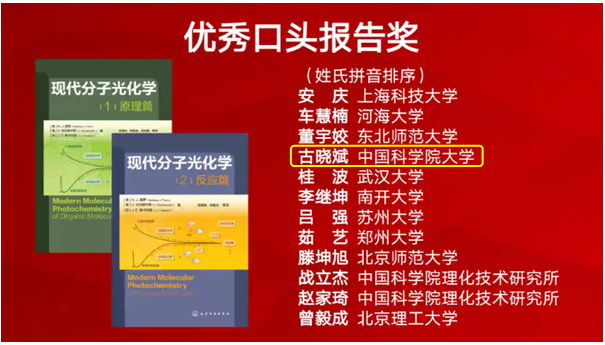
-
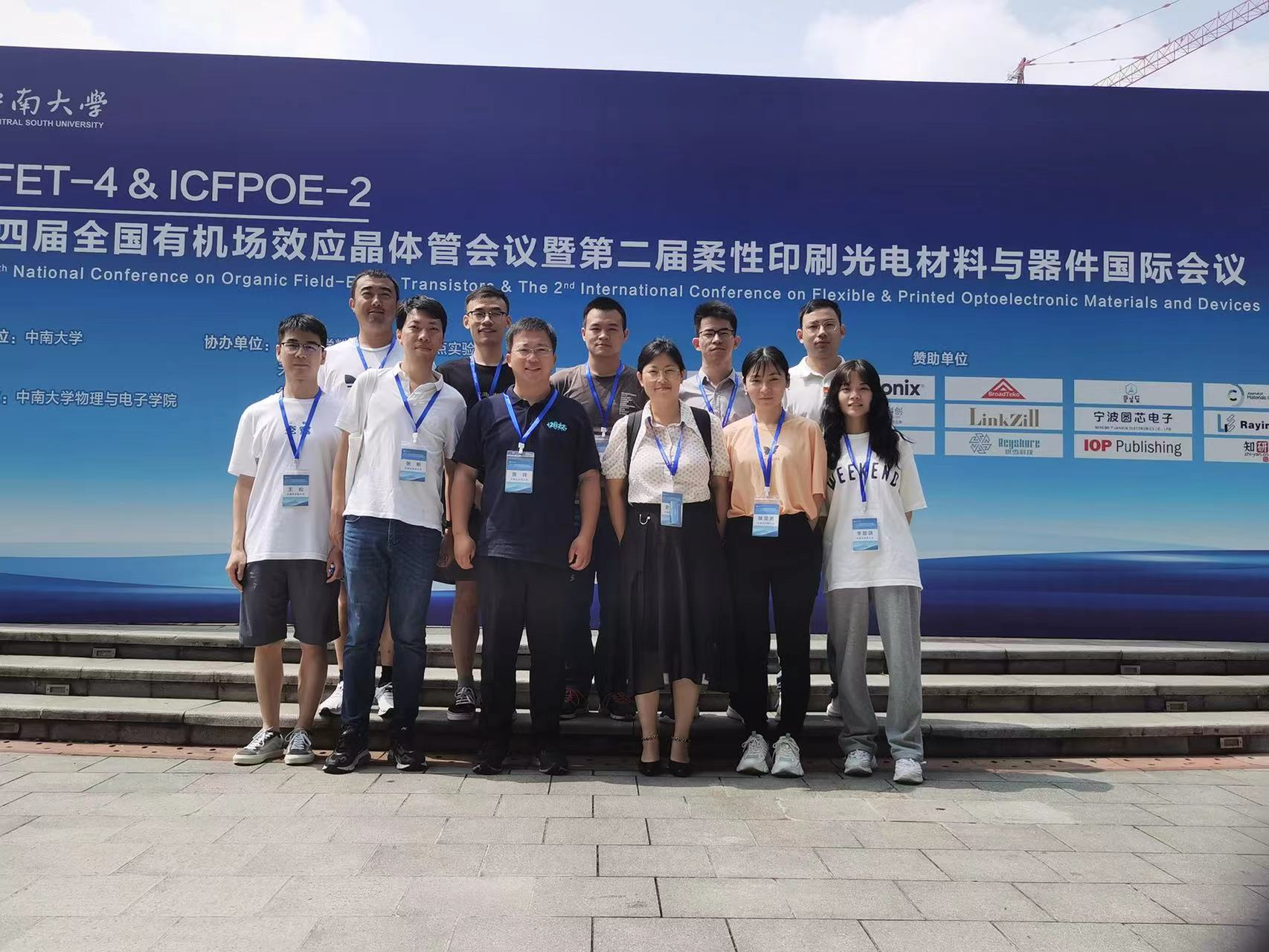 Prof. Huang Hui's team participated in the 32nd Annual Meeting of the Chinese Chemical Society
Prof. Huang Hui's team participated in the 32nd Annual Meeting of the Chinese Chemical SocietyFrom July 29 to 31, 2022, The 4th National Conference on Organic Field-Effect Transistors & The 2nd International Conference on Flexible & Printed Optoelectronic Materials and Devices (OFET-4 & ICFPOE-2) was successfully held in Changsha, Hunan Province, China. Conference on Flexible & Printed Optoelectronic Materials and Devices (OFET-4 & ICFPOE-2) was successfully held at the Hyundai Kale Hotel in Changsha, Hunan Province. Prof. Huang Hui's team of six students (Wei Yanan, Chen Hao, Wang Song, Li Congqi, Gu Xiaobin, Zhang Meng) and two postdocs (Gao Jinhua and Li Zijie), led by Mr. Huang Hui, Mr. Shi Qinqin and Mr. Zhang Peasant, attended the conference.

During the meeting, Mr. Huang Hui gave an invited presentation entitled "Theory, Characterization and Application Study of Non-Covalent Conformation Locks", Mr. Shi Qinqin gave an oral presentation entitled "The Green Synthetic Methods for Organic Semiconductors", and other students presented their results in the form of poster presentations.
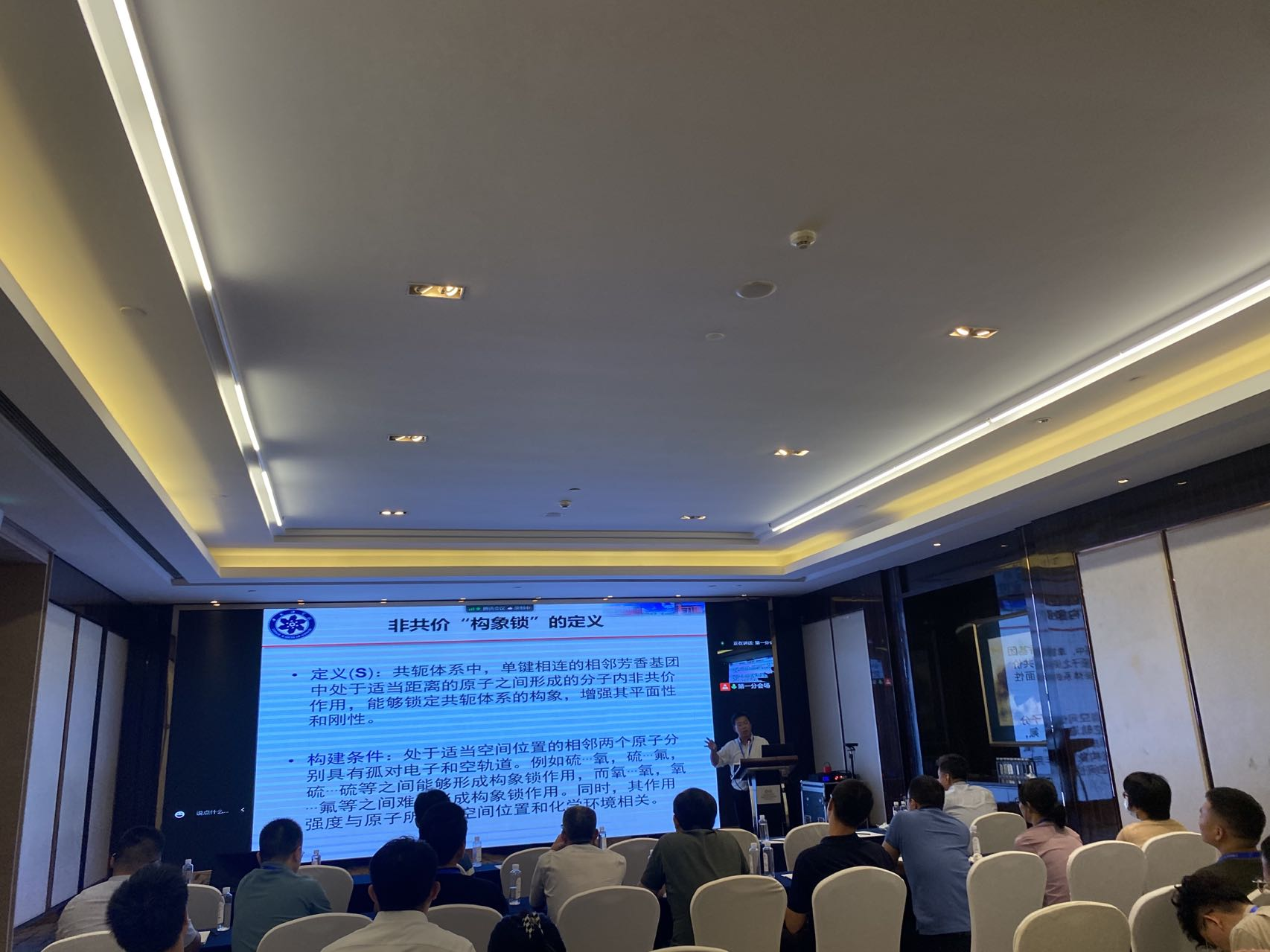
The conference will focus on the two themes of "field-effect transistors" and "flexible printed optoelectronic materials and devices", with the aim of academic exchange, discussing the latest progress of domestic and foreign research, opportunities and challenges, as well as future development directions, enhancing the communication and cooperation between domestic and foreign colleagues in the field of field-effect transistors and flexible printed optoelectronic materials and devices, and jointly promoting the cooperation and industrialization of field-effect transistors and flexible printed optoelectronic materials and devices.
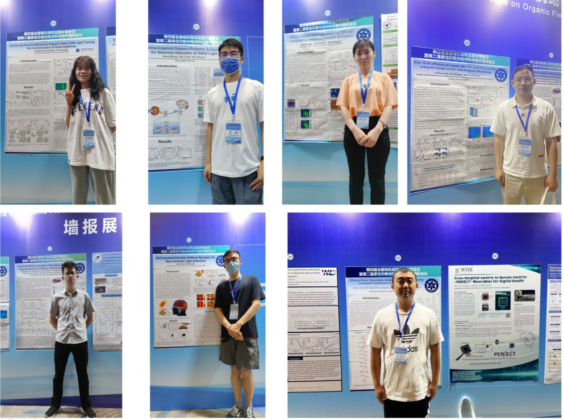
In addition, 8 RSC-JMCC Outstanding Oral Presentation Awards and 12 IOP Outstanding Poster Awards were selected by the expert group at the end of this meeting. Ms. Qinqin Shi of the group won the Outstanding Oral Presentation Award and Mr. Hao Chen won the Outstanding Poster Award.
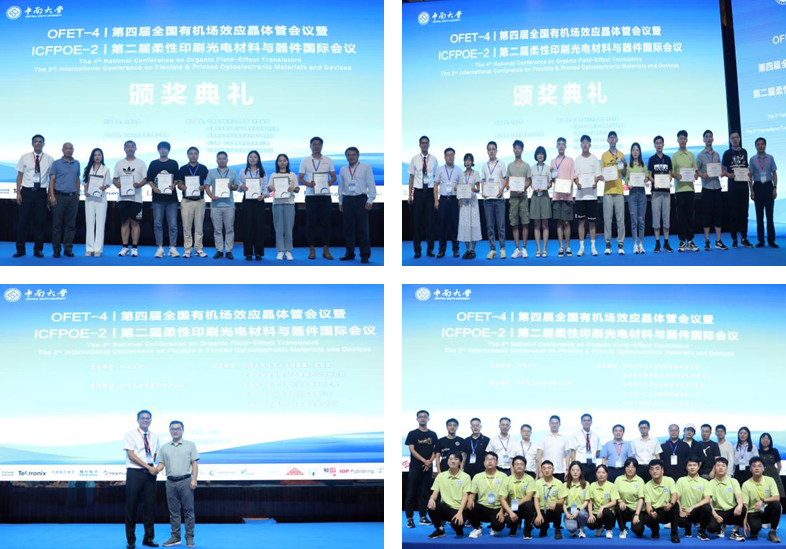
-
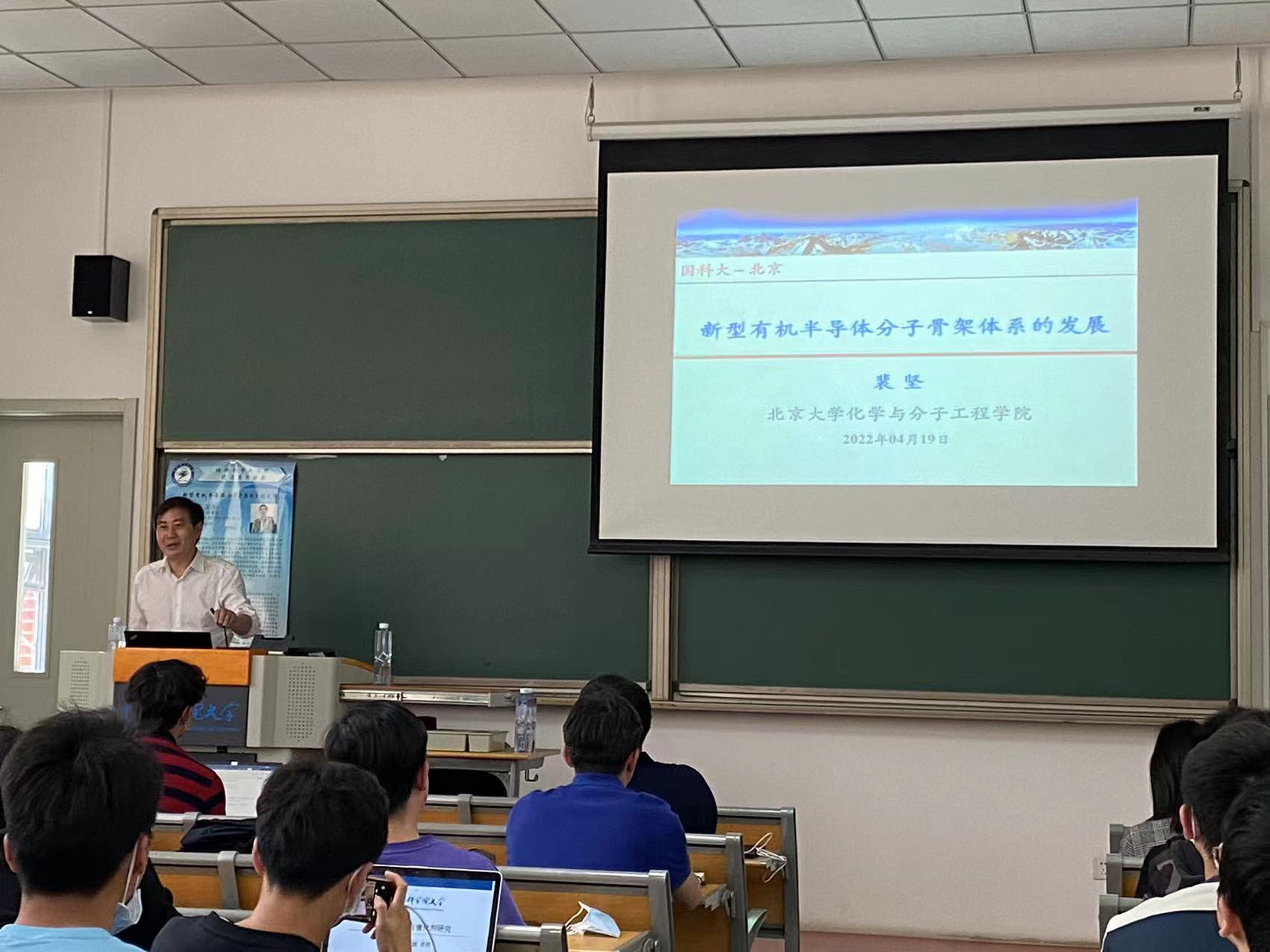 Professor Pei Jian's Lecture on "Development of Novel Organic Semiconductor Molecular Framework Systems"
Professor Pei Jian's Lecture on "Development of Novel Organic Semiconductor Molecular Framework Systems"Professor Pei Jian pointed out in his report that organic electronic materials, especially organic semiconductor materials, have a wide range of applications in life and industry. In order to improve the performance of organic semiconductor devices, scientists use molecular doping to control the carrier concentration of organic semiconductor devices. and the Fermi level, filling its carrier traps and improving the electrical conductivity of the material, thereby achieving a significant improvement in the performance of organic semiconductor materials. To accomplish molecular doping of organic semiconductor devices, the properties of molecular dopants are particularly critical. A variety of new n-type dopants have been designed in view of the two problems existing in the existing n-type dopants: the counter-ion becomes an impurity that hinders charge transport and the phase separation of the dopant and the semiconductor is caused by poor miscibility.
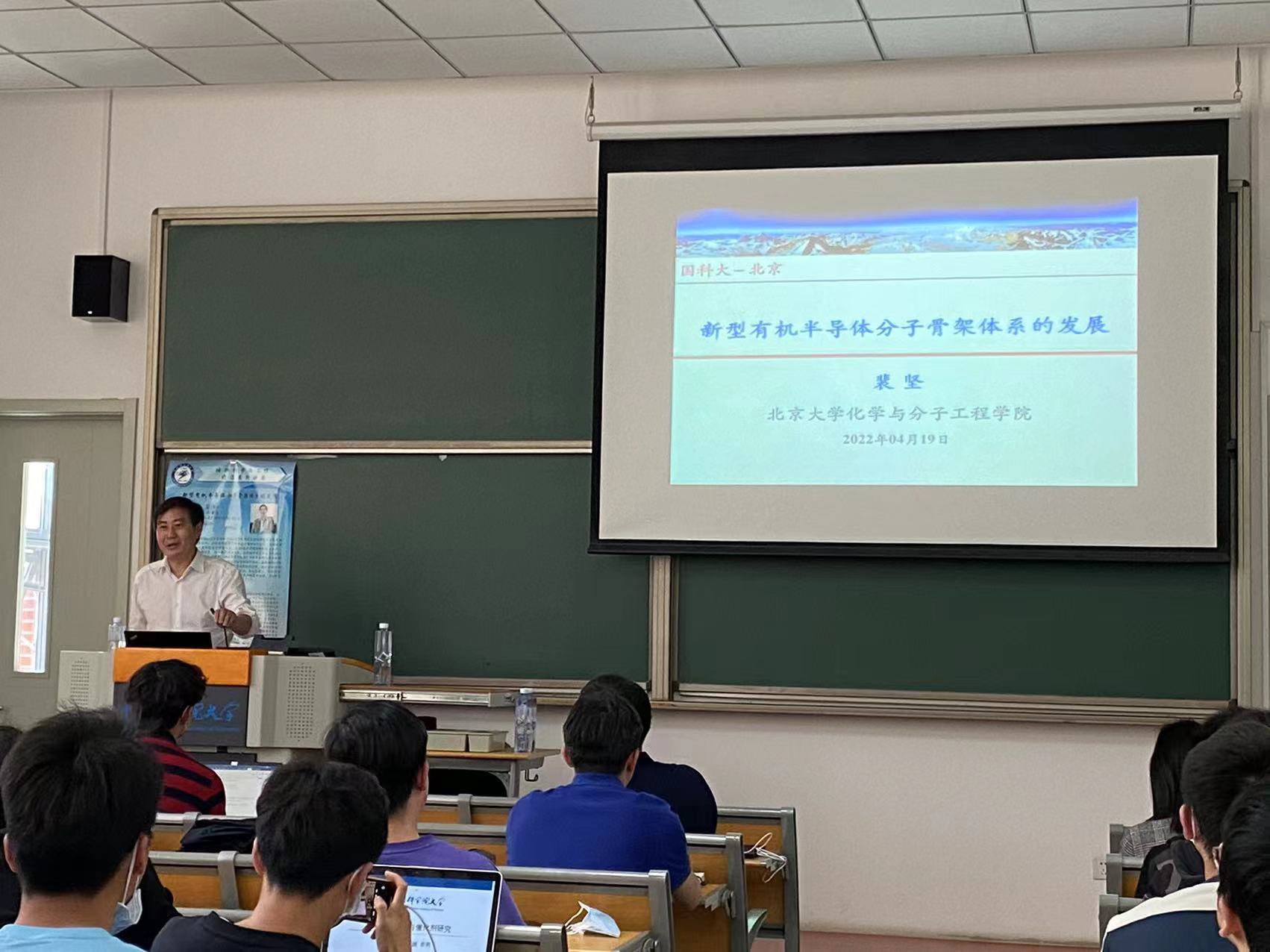
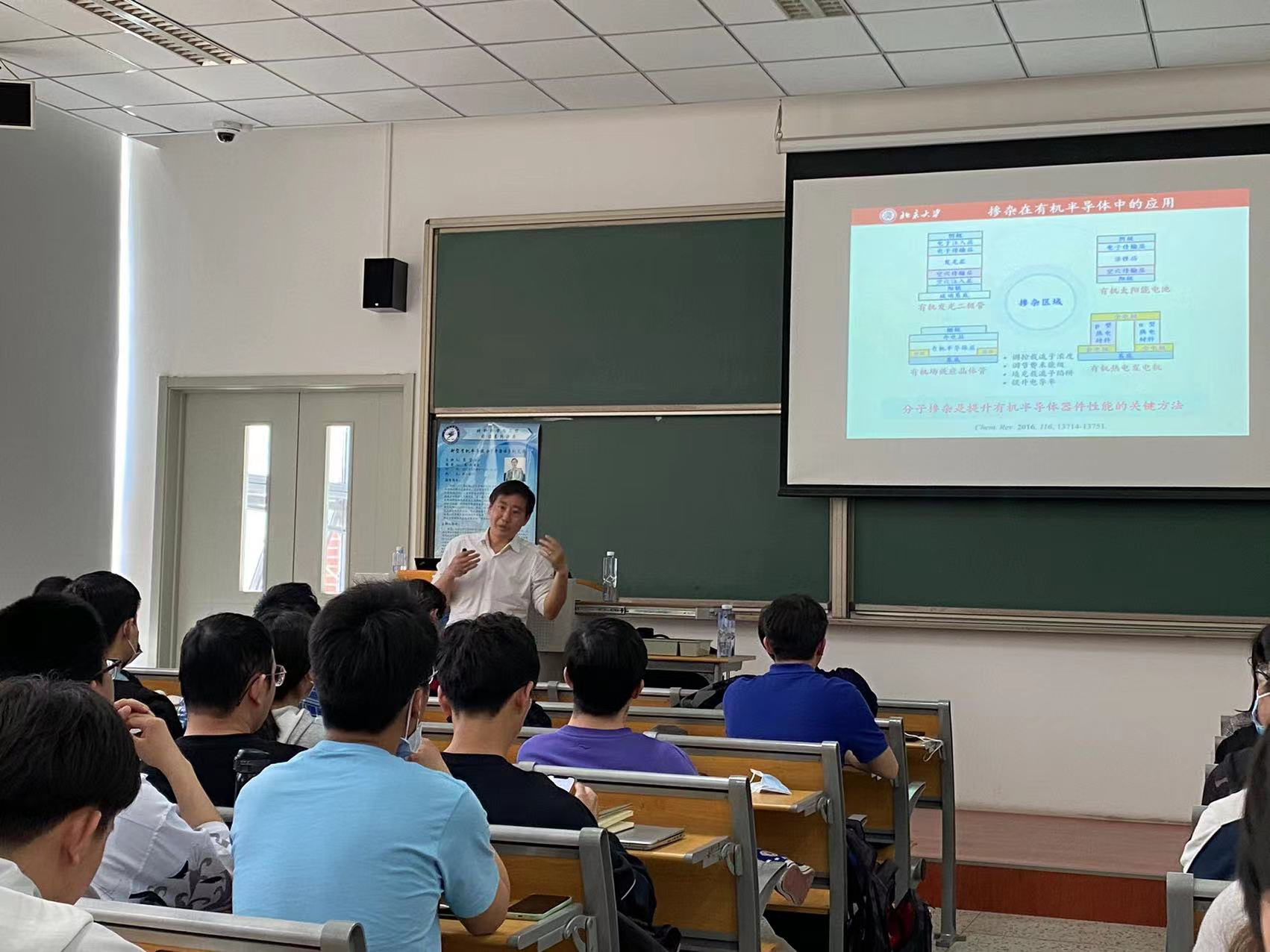
Prof. Pei Jian introduced the research progress of his research team in designing n-type dopants through organic negative hydrogen compounds, from doping mechanism, negative hydrogen mechanism, molecular design, electron-deficient framework system, synthesis route, performance characterization and industrialization. Excellent results have been achieved in applications and other aspects, and thermally excited doping, highly miscible TAM and N-heterocyclic carbene dopants have been introduced. At the end of the report, Professor Pei Jian also briefly introduced a variety of new n-type dopants, and predicted the future development trend of this field.
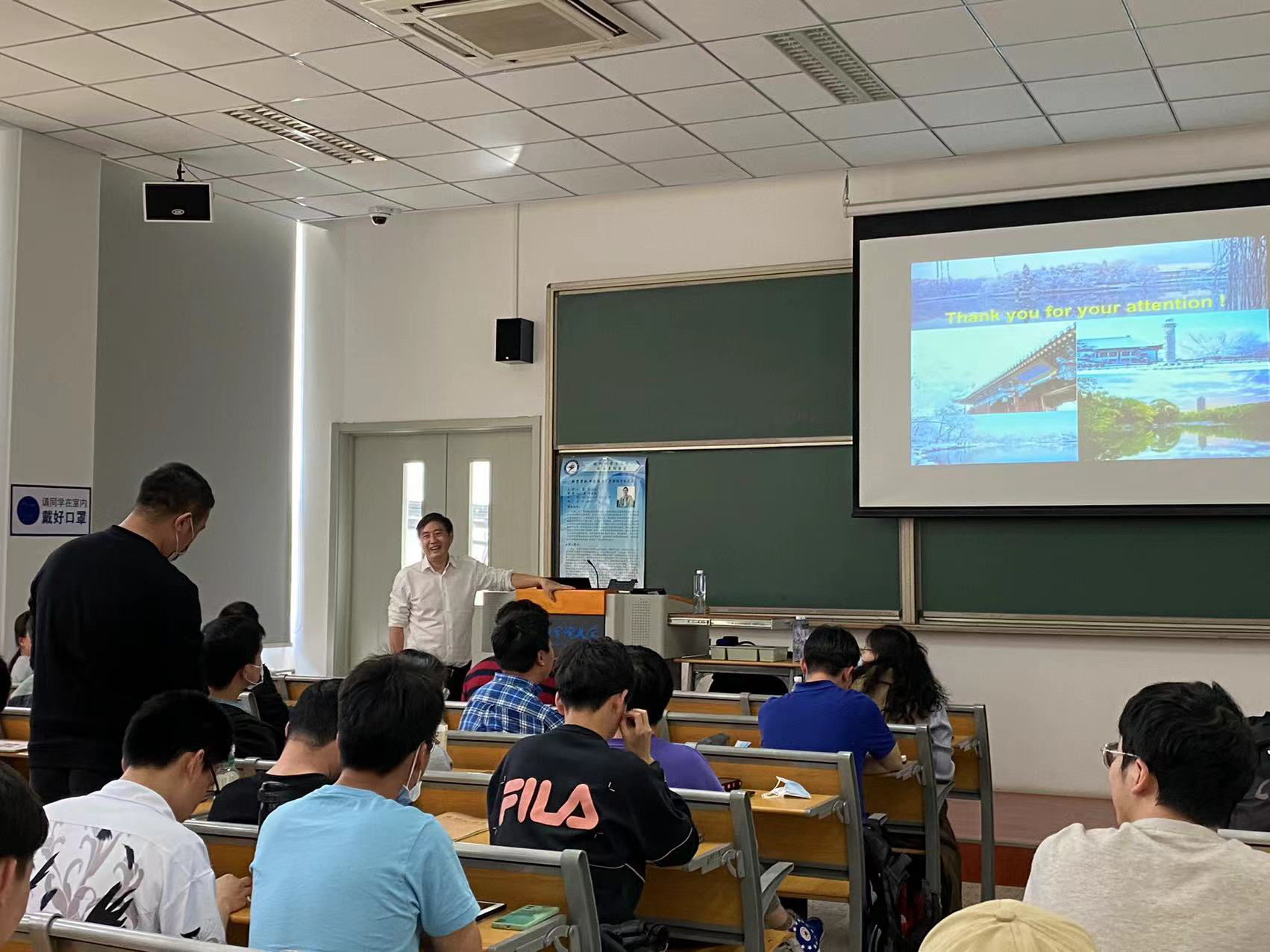
In the Q&A session of the report, the teachers and students of the National Academy of Sciences and Professor Pei Jian conducted in-depth exchanges and discussions on academic and scientific research issues such as doping mechanism characterization, design principles of n-type dopants, and development of carbene dopants. The atmosphere was warm and the lecture ended successfully with warm applause.
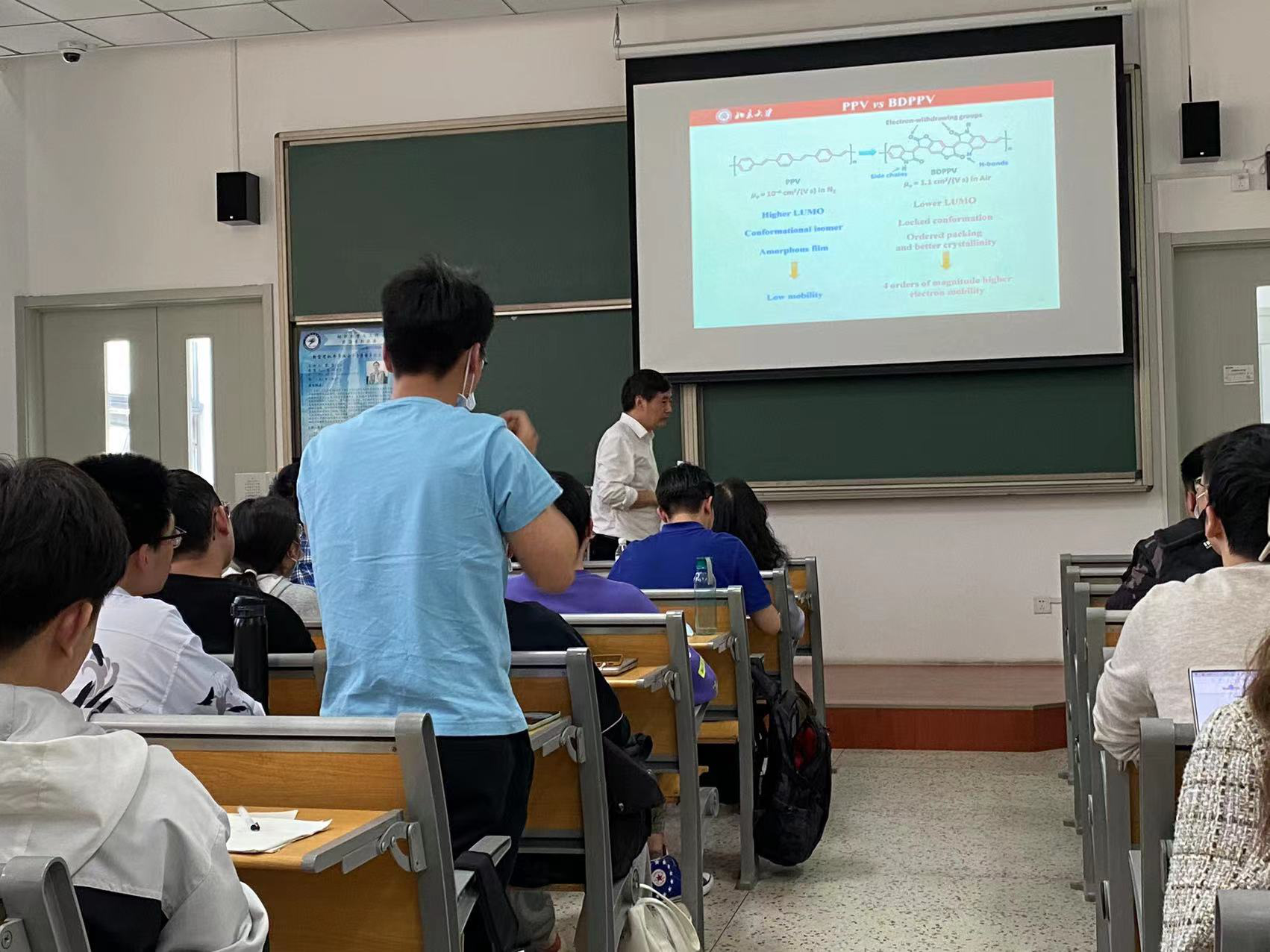
Pei Jian, born in December 1967. Professor at the School of Chemistry and Molecular Engineering, Peking University. He received his Ph.D. from Peking University in 1995. Mainly engaged in the synthesis, characterization and device research of organic polymer semiconductor materials. Mainly include: design and synthesis of a series of high-performance star material systems, controllable modulation of the self-assembly behavior and microstructure of materials, and improvement of existing processes for device processing, and ultimately achieve high-efficiency and industrializable devices. So far, he has published more than 280 SCI-indexed papers in international academic journals, among which more than 50 papers have been published in international authoritative journals such as Nature sub-journal and JACS. In the international academic exchange activities, he has been invited to report more than 30 times in international conferences such as the annual meeting of the American Chemical Society, the annual meeting of the International Materials Research Association and the International Synthetic Metal Conference, and has served as the chairman of international conferences or branches for many times. He has applied for 9 national invention patents, 6 of which have been authorized, 3 international patents, 1 Taiwan patent, 2 US patents authorized in cooperation with the company, and 5 books. In 2004, he won the Outstanding Youth Fund of the National Natural Science Foundation of China; in 2010, he won the 5th Chinese Chemical Society-BASF Company Youth Knowledge Innovation Award; in 2011, he won the 7th Beijing Higher Education Teacher Award; in 2012, he was hired as an educator He is a Distinguished Professor of the Ministry of Education; in 2013, he won the first prize of the Natural Science Award of the Ministry of Education (the first person to complete it), and the first prize of the 7th Beijing Higher Education Teaching Achievement Award; in 2014, he won the 3rd Chinese Chemical Society-Evonik Chemical Innovation In 2016, he won the second prize of Beijing Science and Technology Award (the first person to complete it). In 2018, he won the second prize of the National Teaching Achievement Award. Invited to serve as the International Advisory Board of the most important conference in the field of polymer semiconductors - the International Conference on Synthetic Metals, the International Advisory Board of the international academic journal Chem. Asian J., and the Editorial Board Chair of Asian J. Org. Chem. In 2020, he was awarded the National Teaching Teacher.
-
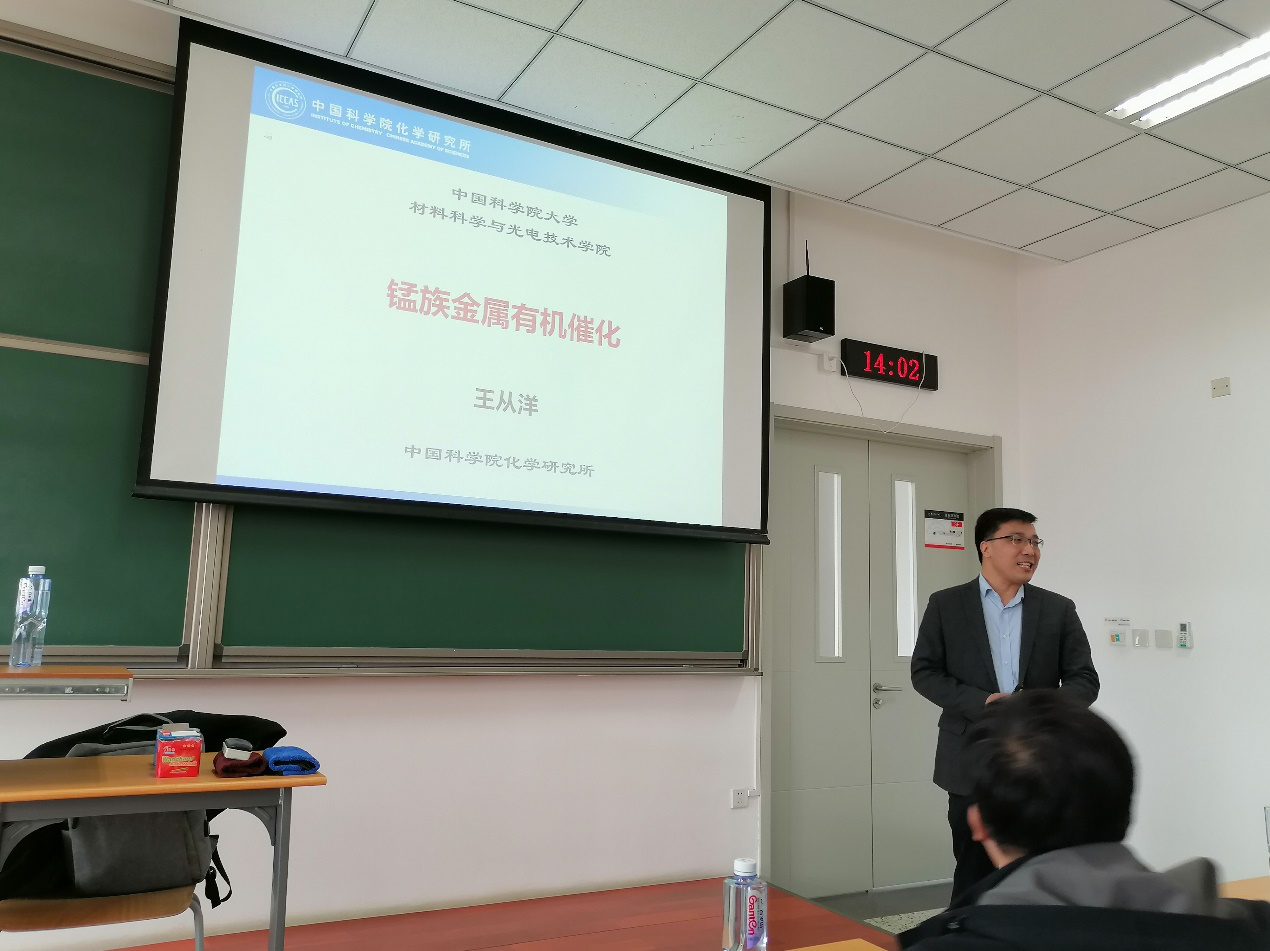 Professor Wang Congyang's "Manganese Group Metal Organocatalysis" Lecture
Professor Wang Congyang's "Manganese Group Metal Organocatalysis" LectureOn the afternoon of March 16, 2022, researcher Wang Congyang from the Institute of Chemistry, Chinese Academy of Sciences was invited by Professor Huang Hui from the School of Materials Science and Optoelectronic Technology to give a lecture on "manganese group metal organocatalysis" at 2-329.

In his report, Professor Wang Congyang mainly introduced a series of progress made by his research group in the catalytic C-H bond functionalization of manganese group metals (especially manganese metal complexes), including manganese-catalyzed enyne addition reaction, manganese-catalyzed polar Addition reactions, manganese-catalyzed hydrogen transfer reactions, etc. In view of the particularity of manganese group metal complexes, Prof. Wang Congyang's research group developed catalytic strategies such as manganese acid synergistic catalysis and manganese base synergistic catalysis, which successfully solved the transformation of manganese group metals from stoichiometric catalysis to catalytic quantity catalysis. At the same time, a series of C-H bonds on aromatic rings were successfully functionalized and modified, and the functional groups were well tolerated.
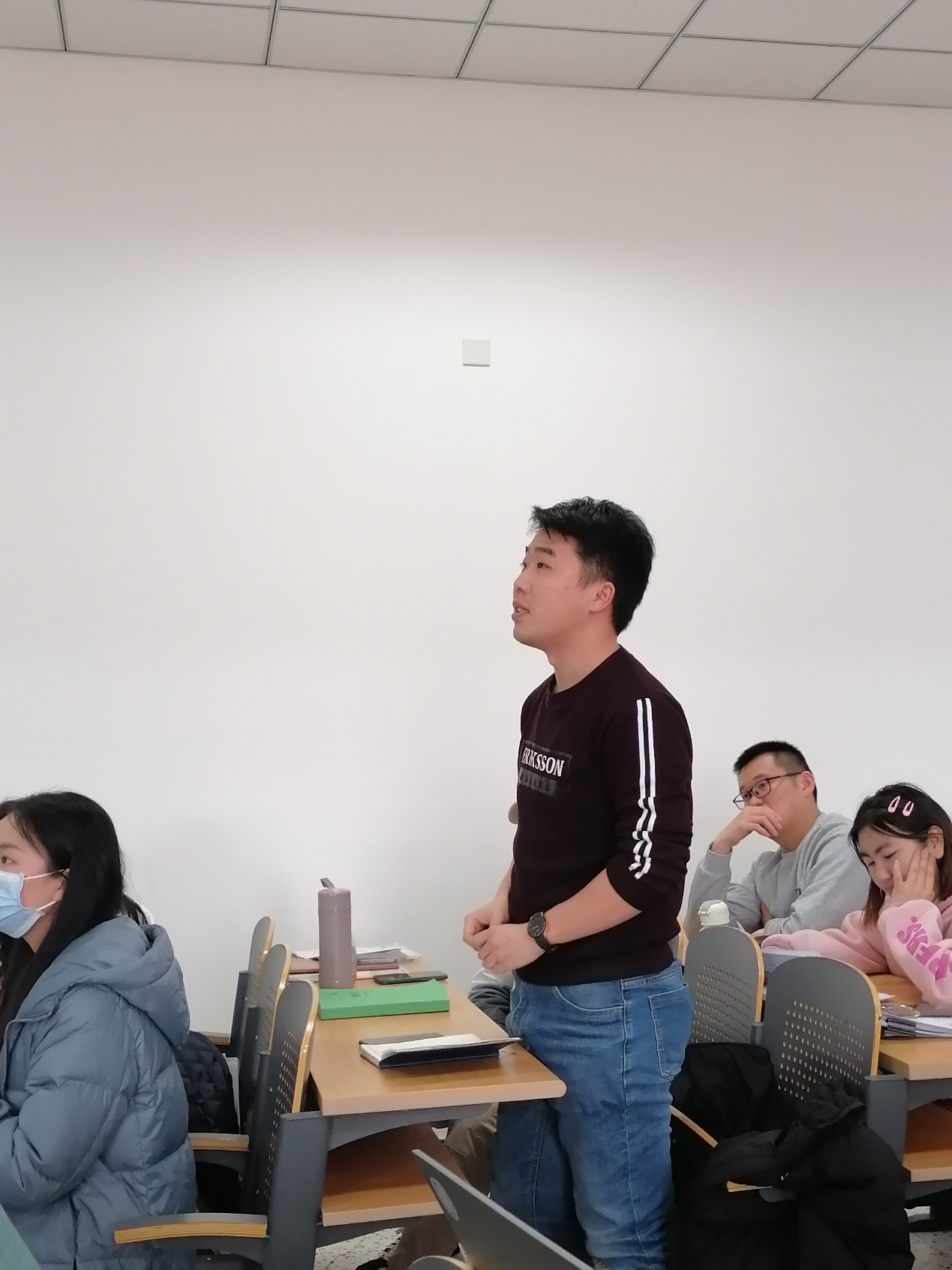
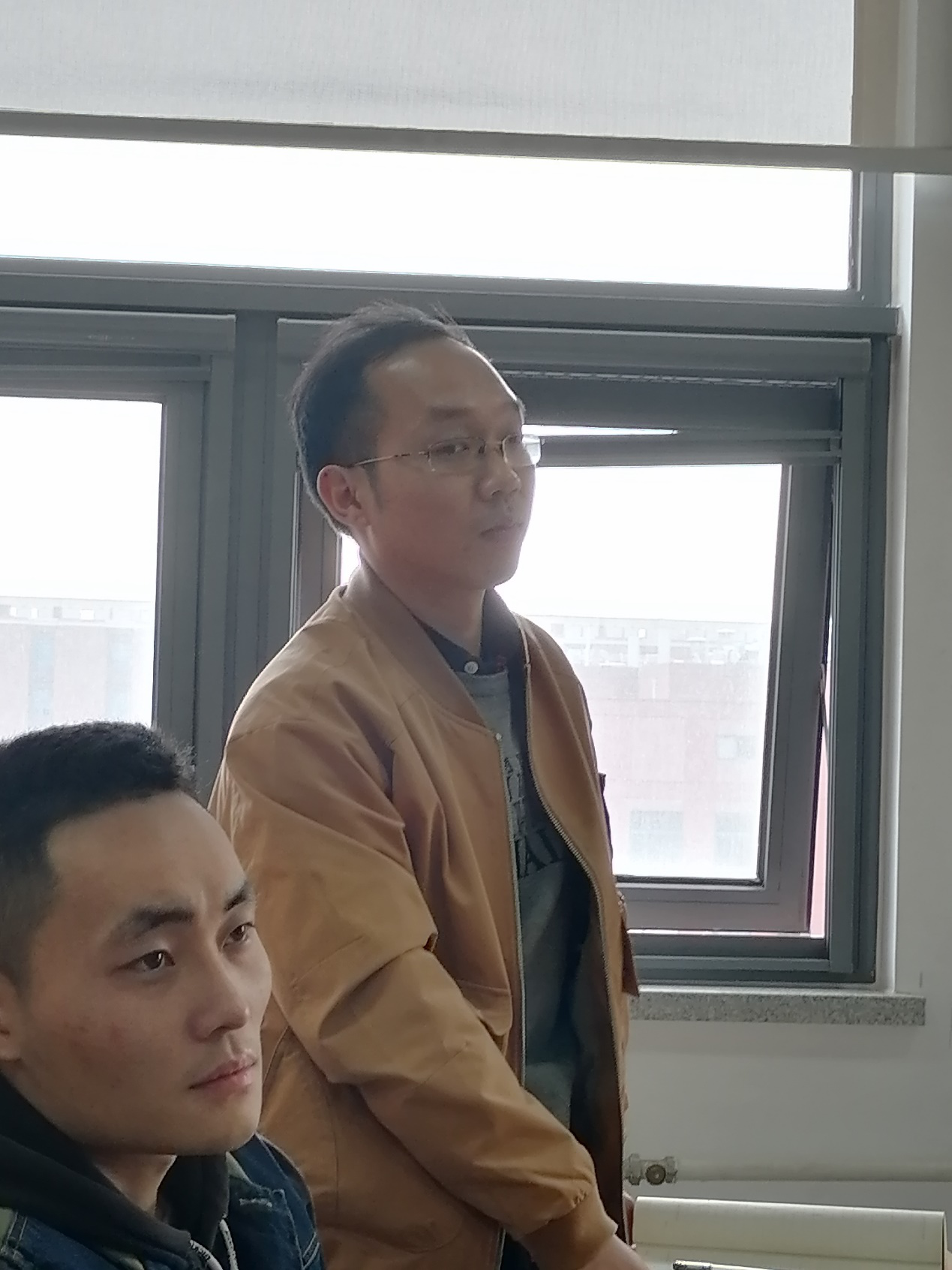
Wang Congyang
Education background:
2000-2005 Ph.D., Peking University, Supervisor: Professor Xi Zhenfeng
1996-2000 Undergraduate, Nanjing University, Supervisor: Professor Sun Xiangzhen and Professor Pan Yi
work experience:
2015-present University of Chinese Academy of Sciences, post professor
2010-present, Institute of Chemistry, Chinese Academy of Sciences, research group leader, researcher, doctoral supervisor
2007-2010 University of Münster, Germany, Humboldt Postdoctoral Fellow, Supervisor: Prof. Frank Glorius
2005-2007 Peking University, postdoctoral fellow, supervisor: Professor Xi Zhenfeng
Awards and Honors:
2020 National Natural Science Foundation of China "Science Fund for Distinguished Young Scholars"
2020 CCL Outstanding Young Scholar Award
2019 The 10th Chinese Chemical Society-BASF Youth Knowledge Innovation Award
2019 The 5th China Homogeneous Catalysis Youth Award
2019 Chinese Chemical Society "Periodic Table of Elements for Young Chinese Chemists" event, spokesperson of manganese element
2019 Green Synthesis & Catalysis, Elsevier, Associate Editor
2017 Chinese Chemistry Letters, Elsevier, Associate Editor
2017 Chinese Journal of Chemistry, Wiley-VCH, Editorial Board Member of Rising Stars
2015 Thieme Chemistry Journals Award, Germany
2015 Asian Core Program Lectureship Award, Japan
2015 Asian Core Program Lectureship Award, Singapore
2013 National Natural Science Foundation of China "Outstanding Youth Science Fund"
2011 Alexander von Humboldt Equipment Subsidy, Germany
2010 "Introduction of Foreign Outstanding Young Talents Program" by Institute of Chemistry, Chinese Academy of Sciences
2008 Alexander von Humboldt Research Fellowship, Germany
2006 First-class funding of the 38th China Postdoctoral Science Foundation
2005 Outstanding Graduate of Peking University
